- Home
- Ann M. Martin
Abby in Wonderland Page 4
Abby in Wonderland Read online
Page 4
“You?” I cried in disbelief. How could this little kid be my gram? A closer look revealed that same determined, bright expression in those nearly black eyes. She was who she is even then, I thought, delighted to see my grandmother as a child.
“And that’s Iris, and on the other side is Leah. Behind us is my brother, Solomon.”
I knew my great-uncle Solomon was dead. “How did he die?” I asked.
“World War Two took him. He enlisted in the army just six years after this photo was taken. He was only eighteen when he died.”
“How terrible,” I said.
“It was terrible,” she agreed sadly. There was a slight hardness in her dark eyes, as if she didn’t want to feel too much about this and was choosing not to relive it. She sat forward and ruffled my hair. “But let’s not talk about such things on a glorious summer day.” She stared down at the album in her lap. “The question is,” she said, “how am I going to assemble all this before the party? I want to show it to the whole family.”
“I’ll help you,” I volunteered enthusiastically. It would be fun. There was so much about my extended family I didn’t know. I was eager to learn it all.
Corley, Anna’s friend, showed up bright and early on Monday morning. “Hi,” I said as I came down the stairs, still in my nightshirt.
I’d forgotten how unusual-looking Corley is. She’s very petite, with wild, frizzy carrot-red hair and huge glasses.
“Hello there, Abigail,” she said. I cringed at the sound of my old-fashioned full name. Corley is one of the only people on the planet who insists on using it.
She sat on the couch with Anna, who had a book of music open on her lap. “I think this is a misprint,” Corley said, showing Anna the specific notes in question. “I don’t think the notes are supposed to go like this.”
I know Anna admires Corley as a musician. Corley plays some violin, like Anna, but her specialty is the cello. It’s kind of comical because when she plays, you can hardly even see her sitting behind it.
Yet Corley is an extremely good, serious cellist. She plans to be a concert performer someday. I suppose that’s the basis of her friendship with Anna. They’re both devoted musicians.
“Is it possible?” Anna asked, staring down at the musical notes in the book. “I’ve never heard of a book having a mistake like that in it.”
“It happens, and when it does, it causes all sorts of problems,” Corley assured her.
“What problems? Who has problems?” Gram Elsie asked as she walked into the living room from the casual dining room next to it.
“I was trying to learn a new piece, by Mozart, yesterday, but I couldn’t make it sound right,” Anna explained. “Corley thinks there’s a misprint in the musical notation.”
Gram put her hands on her hips and studied Corley. “You can tell that just from looking at the notes?” she asked, impressed.
Corley blushed appreciatively. “I’ve played this piece myself, so I’m familiar with it. I don’t have my book with me or we could check it right now.”
“There’s a music store in town,” Gram said. “Grandpa and I are heading that way in a few minutes. Why don’t you girls take a ride with us? While we’re there you can go in and compare your book with another one. Anna, if you need a better book, we’ll buy you one.”
“Why are you going into town?” I asked Gram Elsie as I made my way through the dining room and into the kitchen for some breakfast.
“Oh, for this and that,” she replied. “Want to come?”
“Maybe.” I noticed that an extra-large-sized poster board had been laid out on the dining room table. Small piles of Gram’s old photos were placed on different parts of it. “What are you working on?” I asked. Curious, Anna and Corley joined me at the table.
“Grandpa had a brainstorm last night,” Gram said, joining us. “He suggested that I make a big family-tree poster and put it up for the party,” she explained. “Then, when all the family is here — except for a few, like my too-busy-to-come niece Jean — I can ask them to lend me any more letters and pictures and documents they might have. Then I’ll take all their information home with me and buy that computer software you suggested, Abby,” Gram said. “With that, I can make a whole packet about our family and send it to all the relatives.” She winked at me. “Grandpa was very enthusiastic about buying a scanner to put the pictures in. It’s the excuse he’s been waiting for to buy more fancy computer equipment.”
Anna had picked up a half-inch stack from the corner of the board. “Who are all these people?” she asked.
“My mother had twelve brothers and sisters,” Gram explained.
Twelve! I thought. That’s thirteen kids — even more than the Pikes!
“Wow!” Corley cried. “If these twelve kids had kids themselves they’re going to take up half your tree.”
Gram’s expression grew serious. “They should but they don’t,” she said solemnly. “My mother came to America in the nineteen-twenties. Nine of her siblings stayed in Germany and were killed by the Nazis.”
“In the Holocaust, you mean?” Corley asked softly.
Gram nodded. I nodded too. All my life I’d learned about the unthinkable evil of the Holocaust; how, during World War II, the Nazis tortured and killed millions of people just because they were Jewish. I’d read books about it (for instance, Anne Frank’s diary) and we learned about it in school.
Still, books and classes couldn’t prepare me for Gram’s words. Even though I’d known nine of her aunts and uncles had died in the concentration camps, I’d never felt it so strongly before.
Our family tree was suddenly making history seem very real, very personal.
“Maybe I won’t go into town with you,” I said. “I’ll stay here and work on the family tree instead.”
Grandpa Morris came into the room and studied the tree. “The tree should branch off, with the Russian part of the family on one side and the German on the other,” he suggested. “Then you can make the trunk the part where everyone funnels down into America.”
“That’s what I planned,” Gram agreed.
“Grandpa,” I said, “while Gram, Anna, and Corley go into town, why don’t we stay here and draw the tree?”
“Can’t,” he said with a quick glance at Gram. “I have to go with Gram today.”
“No, you don’t, Morris,” said Gram.
“Yes, I do,” he argued. His tone was firm.
“You don’t,” Gram said again.
“I do — and that’s the end of it.” Grandpa walked toward the stairs. “I’ll be right down and we’ll leave.”
Gram Elsie sighed. Something was going on between them, but what?
At that moment, the phone in the kitchen rang. Gram hurried off to answer it. I noticed Mom coming down the stairs. “Corley!” she cried. “How good to see you again.”
I stood in the dining room, looking down at the faces of my ancestors. Among the nine people who died in the Holocaust was a girl about my age, my great-great-aunt Marta. I picked up her picture. Her large brown eyes seemed to gaze directly into mine. She even looked a little like me. It made me shudder.
As I laid the picture down, I could hear Gram on the phone. Her voice had risen slightly, as if she were nervous or upset.
“Yes, I understand that you need to check it again,” she said. “Well, of course it’s upsetting, but better to know than not know. Yes, I’ll be there at two o’clock.”
I suddenly felt this might be a personal conversation. Not wanting to eavesdrop, I moved into the living room, where Corley was updating Mom about people from our old neighborhood.
Dropping into a chair, I pretended to listen to Corley, though my mind wasn’t really on what she was saying. I kept going over what I’d just heard.
What was Gram having checked at two o’clock today? It was something upsetting. That had to be why Grandpa had been so insistent about going with her. She was dealing with something he didn’t want her to face alone.
I didn’t mean to, but from that point on I started to watch Gram Elsie more closely. When Anna, Corley, Gram, and Grandpa returned from town that afternoon, I tried to pry information from Anna.
“Where did Gram and Grandpa go?” I asked, cornering my sister in the kitchen.
“I don’t know,” she answered. “They dropped us at the music store and left. Can you believe Corley was right about my music? She’s so smart. It was a mis —”
“They didn’t say where they were going?” I interrupted her.
She shook her head. “They said they were doing ‘this and that’ — errands, I assumed.”
“If they were doing errands they’d have had bags with them,” I said. “Did they?”
Anna frowned. “Okay, Nancy Drew, what’s going on?”
I opened my mouth to tell her my concerns, but I shut it again before saying anything. If Gram wanted everyone to know about this — whatever it was — she’d have told us. To tell what I’d overheard would be like revealing a confidence. “Nothing’s going on,” I said. “I’m just interested in what everyone did.”
“Sorry, I don’t know what they did,” Anna said.
When I went into the living room to find Gram, she wasn’t there. “She’s taking a nap,” Grandpa Morris told me.
“Isn’t she feeling well?” I hoped this would give Grandpa Morris an opening to talk about what was happening.
“Just a headache. Want to draw that family tree or go to the beach?”
I glanced at the board on the table and then out the window. While everyone was in town, Mom and I had sat at the table and sorted the photos into piles by family group and by year. The most time-consuming part had been trying to figure out where pictures with no year marked on them belonged.
“I’ve done enough tree work for now,” I told him. “I need some sunshine.”
Mom, Anna, and Corley joined Grandpa and me for a trip to the beach.
“I hope this great weather holds for the party,” Grandpa said, gazing up at the glorious blue sky.
“This party is very important to Mom, isn’t it?” my mom observed as Corley and Anna walked down to the water. “More so than usual, it seems.”
I’d been about to join Corley and Anna, but I hesitated, interested in hearing what Grandpa would say. “Yes, she’s determined that the whole family be together this time.”
“But she’s already received some refusals, hasn’t she?” Mom said.
“Yes, and it makes me so mad. What could Jean and the girls be doing that’s so important? And Leah! She could take the Long Island Railroad for heaven’s sake! What could be easier?”
“Why are they still fighting, Dad?” Mom asked.
“Ask Leah, the big mouth!” Grandpa Morris cried. “That woman couldn’t keep a secret if the fate of the earth depended on it. Just one time your mother requests that she not tell the whole world about her —” He cut himself off and looked at me, suddenly noticing I was there. I guess my expression told him I was a little too eager to hear.
“You know, and whatever.” He mumbled the end of his sentence.
“What?” I asked.
He waved his hand. “Oh, who cares. It was a long time ago and it’s not important anymore.”
“Then why don’t you tell me?” I demanded.
“Because it’s not worth going into,” he said, pulling off his polo shirt. “Enough talk, the water is waiting for us. Come on, Abby, race you.”
He began to run and I raced him to the water. There was no longer any doubt in my mind where Mom got her secret-keeping abilities. She was the daughter of two big-time tight-lipped secret keepers.
* * *
That evening and the next day, Gram seemed fine. Better than fine, in fact. She was on an all-systems-go setting for most of Tuesday. That was partly because her best friend, Molly, arrived, in a van crammed with party decorations.
I like Molly. I’ve never met anyone at all like her. She’s overweight and wears these big, blousy, colorful outfits. That day she was wearing a red-and-orange tie-dyed outfit with flowing sleeves. She has thick gray hair, which she usually wears bundled up on top of her head with lots of strands falling loose.
Molly calls everyone except my grandparents “honey,” “darling,” or “sweetie.” It makes her sound very affectionate, but I suspect it’s just because she doesn’t want to have to remember any names. (She knows my grandparents’ names, so she just calls them Elsie and Morris.)
She and Gram began hauling things out of the back of the van. These were not ordinary party decorations. Molly works as a set designer for Broadway shows. She’d managed to borrow a few spectacular set pieces for Gram’s party. Some were from an Off-Broadway production of Alice in Wonderland. But others were Molly’s own inspired choices.
“Careful with that, darlings,” she told Anna and me as we staggered under the weight of a golden throne. “Until last week that was the king’s throne in The King and I. It had to be changed when the new actor came in to play the king. He needed a bigger throne. Still … it may have to go back if a smaller king comes in after this one leaves to make a movie in two months.”
“For now it’s the White Queen’s throne, my throne,” Gram said. “I’m honored.”
“You should be,” Molly said. “Not everyone gets to share a seat with the King of Siam.”
That afternoon we helped set up prop pieces, which included an ivy-wreathed column that had been used in A Funny Thing Happened on the Way to the Forum, a candelabra from The Phantom of the Opera, and a movable cardboard wall painted to look like stone from Les Misérables.
“These will create a Wonderland effect,” Gram Elsie said, her face glowing.
“Wait until you see what else I’ve brought,” Molly said, disappearing into her van for a moment. She pushed a TV-sized cardboard box toward the back of the van. Then another one. “Elsie, have your sweet granddaughters help me with these,” she called from inside the van.
Anna and I sprang to the back of the van to help. “Costumes!” Anna cried as she pulled open one of the boxes.
“Broadway costumes!” Molly said as she climbed out of the van with a third box in her arms. “There aren’t any complete Alice in Wonderland costumes in here, but there’s certainly enough to begin creating from.”
“Gram! Look at this!” Anna cried, lifting a gorgeous golden, jeweled crown from the top of the box. “How about this for your White Queen costume!”
Gram Elsie took it from her. “Molly, did you steal the crown jewels for this one?” she asked.
“Another fabulous fake,” Molly said. “Put it on.” Gram placed the crown on her head. “You must have been a queen in another lifetime,” Molly pronounced. “It’s you!”
Gram smiled and took it off. “It certainly made me feel queenly.”
We were so busy that the rest of the day flew by. By the time we were done, we had all the things we’d need to make the backyard the most wonderful Wonderland I could imagine. Gram, Molly, Anna, and I stood together admiring our work. “No one will believe this!” I said. “This will be the most awesome party ever.”
As I spoke Grandpa came out and handed Gram the cordless phone. “It’s the caterer,” he said. “He wants to make some change in the menu.”
Gram took the phone and listened to what the caterer had to say. “That sounds fine,” she said. “But I need to look at our original menu before I can be sure. I’ll have to go inside to find it.”
“I’ll get it,” I volunteered. “Where is it?”
“On the right-hand night table in our bedroom,” she informed me.
“Be right back.” I sprinted into the house and up the stairs. In Gram and Grandpa’s bedroom I looked at the right-hand night table and saw a box of tissues and an issue of Time magazine. No list. The left-hand table was empty.
I made a slow turn around the sunny, neat bedroom. Where else would Gram put that list? I wondered.
Crossing
the room to Gram’s desk, I lifted some blank notepads, hoping the list would be beneath them.
It wasn’t. But I couldn’t stop staring at what was underneath. A glossy pamphlet entitled “What You Need to Know About Breast Cancer.”
My heart pounded. Breast cancer. Why did Gram have information about breast cancer?
With a trembling hand, I picked up the pamphlet. More brochures and papers lay beneath it. There was more information about breast cancer, an X ray of some sort, and a letter, addressed to Gram, typed on a doctor’s letterhead.
Although I ached to read the letter, I didn’t. Seeing it made me realize it wasn’t right to snoop through Gram’s things. I restacked everything and straightened the pile.
Breast cancer! I couldn’t believe it. I didn’t know much about it, but I knew cancer was a terrible, life-threatening disease. People could die from cancer.
“Abby!” Grandpa Morris called from the stairs. Suddenly feeling guilty, I practically jumped away from the desk. He appeared in the doorway. “Gram wants to know if you found her list,” he said.
“No,” I replied in a quivering voice.
Grandpa stepped farther into the room. “Are you okay? You look a little pale.”
“I — I’m fine. I just can’t find that list anywhere!”
He patted my shoulder. “Don’t worry about it. I’m sure she has it all in her head anyway. She always does.”
I gazed up at him. Did he know about this? He had to! How could he be so calm and cheerful? How could either of them act normal? I wanted to blurt out, “Grandpa, does Gram have breast cancer?” but I couldn’t bring myself to do it. I wasn’t supposed to know.
“She said she might have left it in the kitchen,” he said, leaving the room. “I’m going to look there.”
I wanted to follow him. But my feet felt glued to the spot where they stood as my mind reeled with this new information. Gram didn’t even look sick. She’d shoved around heavy theatrical props with us all day. It was so confusing. Maybe she didn’t have breast cancer. She might be collecting the information for a friend.

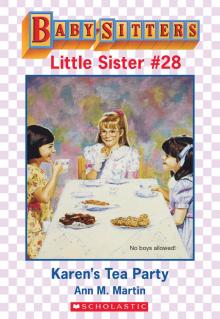 Karen's Tea Party
Karen's Tea Party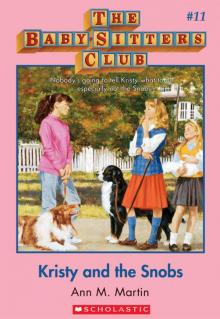 Kristy and the Snobs
Kristy and the Snobs Best Kept Secret
Best Kept Secret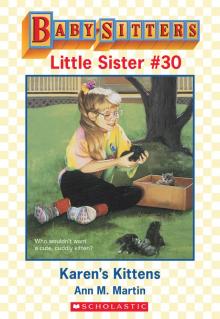 Karen's Kittens
Karen's Kittens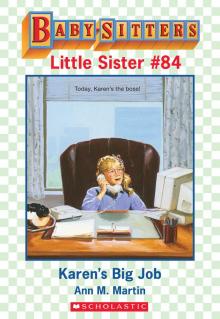 Karen's Big Job
Karen's Big Job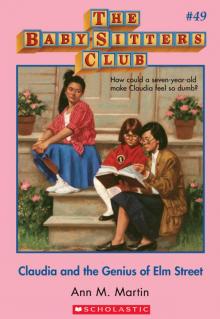 Claudia and the Genius of Elm Street
Claudia and the Genius of Elm Street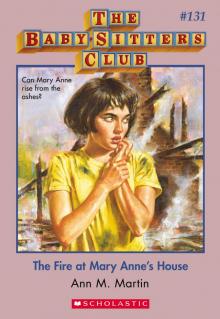 The Fire at Mary Anne's House
The Fire at Mary Anne's House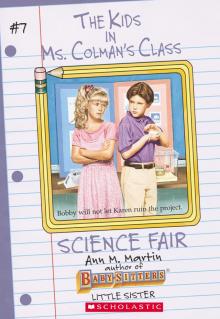 Science Fair
Science Fair Me and Katie (The Pest)
Me and Katie (The Pest)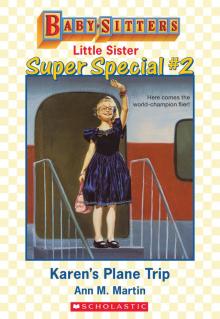 Karen's Plane Trip
Karen's Plane Trip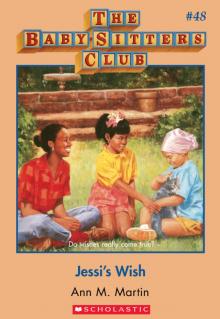 Jessi's Wish
Jessi's Wish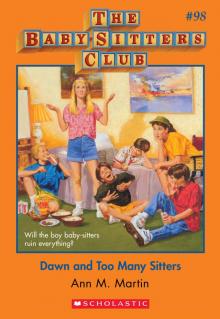 Dawn and Too Many Sitters
Dawn and Too Many Sitters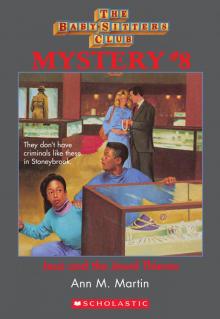 Jessi and the Jewel Thieves
Jessi and the Jewel Thieves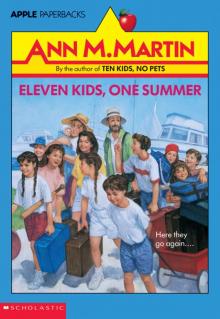 Eleven Kids, One Summer
Eleven Kids, One Summer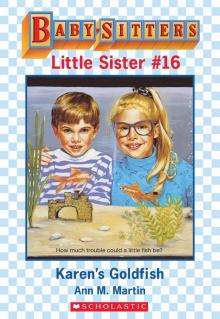 Karen's Goldfish
Karen's Goldfish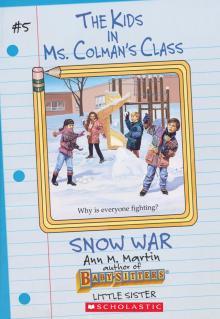 Snow War
Snow War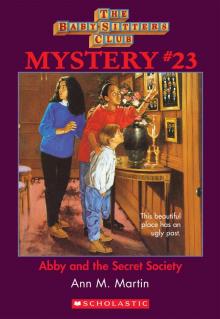 Abby and the Secret Society
Abby and the Secret Society Keeping Secrets
Keeping Secrets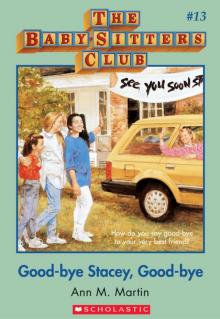 Good-Bye Stacey, Good-Bye
Good-Bye Stacey, Good-Bye Karen's Sleepover
Karen's Sleepover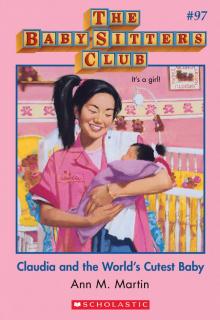 Claudia and the World's Cutest Baby
Claudia and the World's Cutest Baby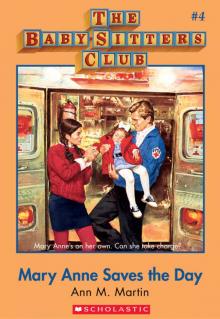 Mary Anne Saves the Day
Mary Anne Saves the Day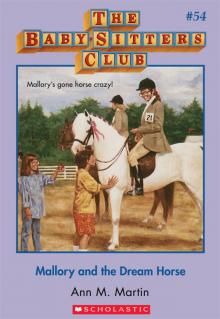 Mallory and the Dream Horse
Mallory and the Dream Horse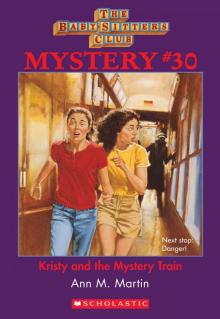 Kristy and the Mystery Train
Kristy and the Mystery Train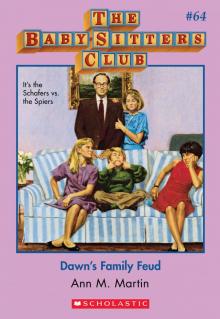 Dawn's Family Feud
Dawn's Family Feud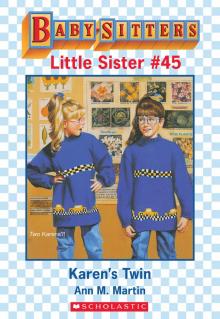 Karen's Twin
Karen's Twin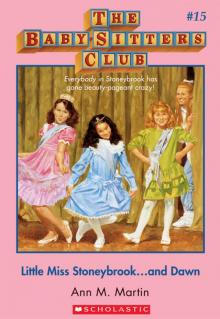 Little Miss Stoneybrook... And Dawn
Little Miss Stoneybrook... And Dawn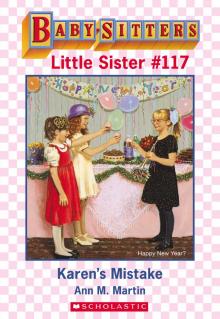 Karen's Mistake
Karen's Mistake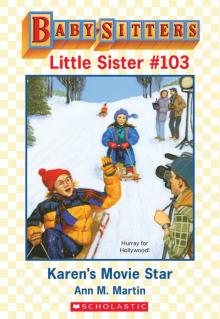 Karen's Movie Star
Karen's Movie Star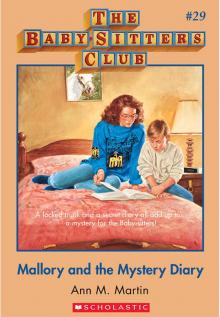 Mallory and the Mystery Diary
Mallory and the Mystery Diary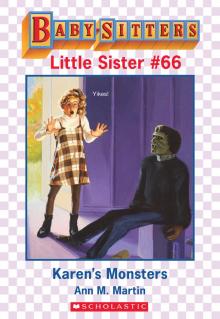 Karen's Monsters
Karen's Monsters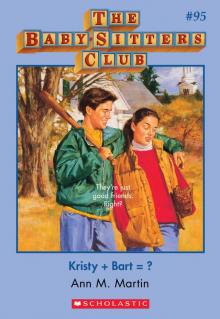 Kristy + Bart = ?
Kristy + Bart = ?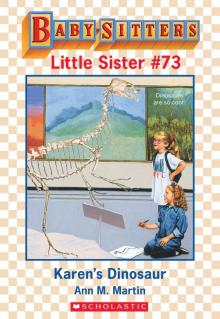 Karen's Dinosaur
Karen's Dinosaur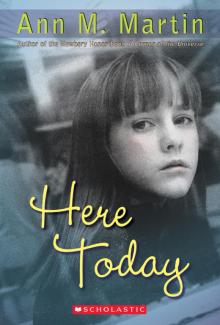 Here Today
Here Today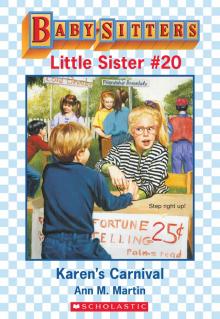 Karen's Carnival
Karen's Carnival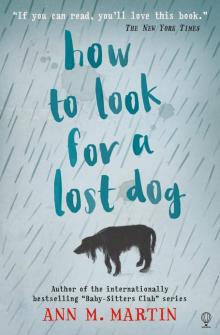 How to Look for a Lost Dog
How to Look for a Lost Dog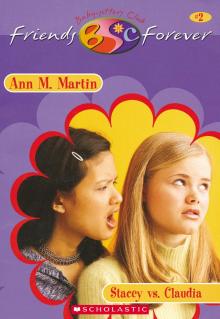 Stacey vs. Claudia
Stacey vs. Claudia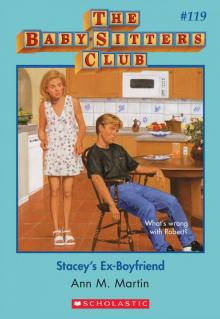 Stacey's Ex-Boyfriend
Stacey's Ex-Boyfriend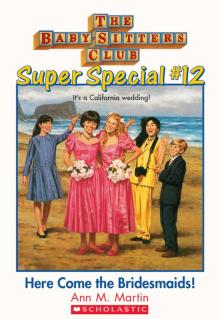 Here Come the Bridesmaids!
Here Come the Bridesmaids! Graduation Day
Graduation Day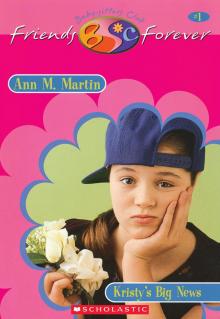 Kristy's Big News
Kristy's Big News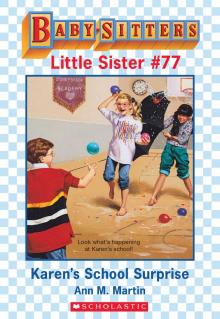 Karen's School Surprise
Karen's School Surprise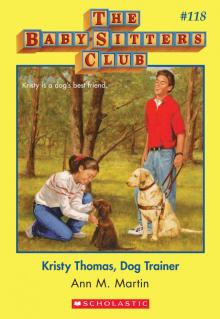 Kristy Thomas, Dog Trainer
Kristy Thomas, Dog Trainer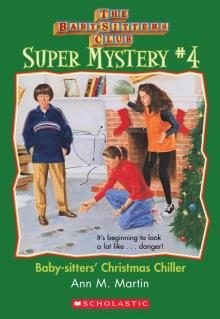 Baby-Sitters' Christmas Chiller
Baby-Sitters' Christmas Chiller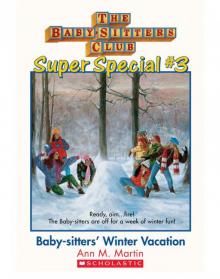 Baby-Sitters' Winter Vacation
Baby-Sitters' Winter Vacation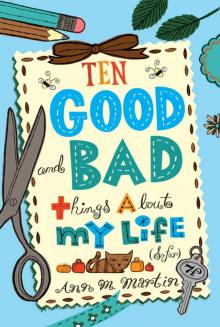 Ten Good and Bad Things About My Life
Ten Good and Bad Things About My Life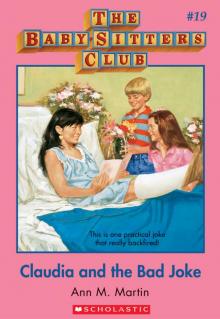 Claudia and the Bad Joke
Claudia and the Bad Joke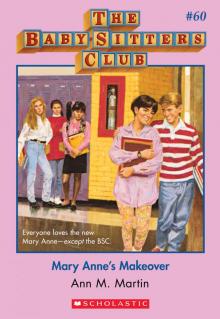 Mary Anne's Makeover
Mary Anne's Makeover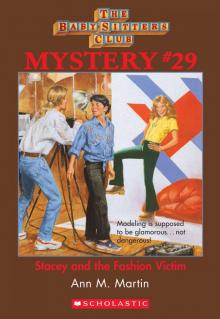 Stacey and the Fashion Victim
Stacey and the Fashion Victim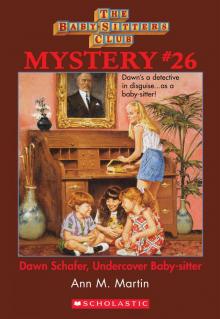 Dawn Schafer, Undercover Baby-Sitter
Dawn Schafer, Undercover Baby-Sitter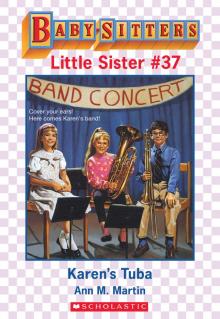 Karen's Tuba
Karen's Tuba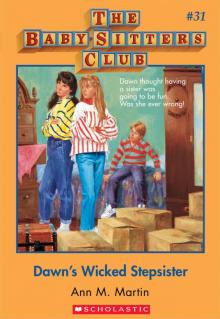 Dawn's Wicked Stepsister
Dawn's Wicked Stepsister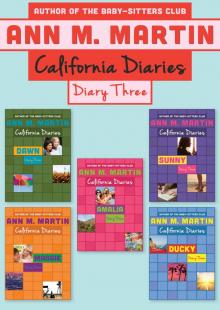 Diary Three: Dawn, Sunny, Maggie, Amalia, and Ducky
Diary Three: Dawn, Sunny, Maggie, Amalia, and Ducky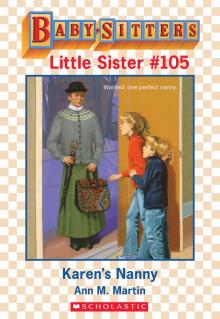 Karen's Nanny
Karen's Nanny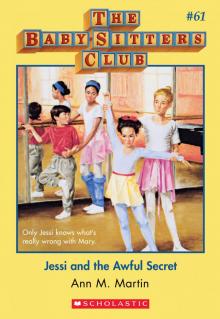 Jessi and the Awful Secret
Jessi and the Awful Secret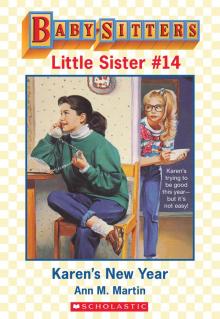 Karen's New Year
Karen's New Year Karen's Candy
Karen's Candy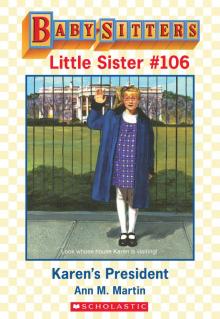 Karen's President
Karen's President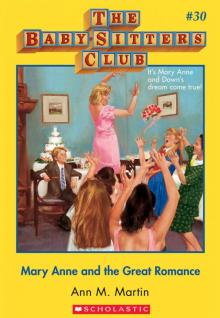 Mary Anne and the Great Romance
Mary Anne and the Great Romance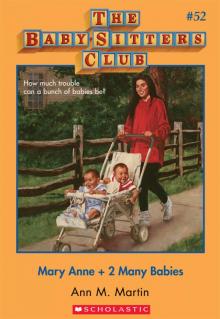 Mary Anne + 2 Many Babies
Mary Anne + 2 Many Babies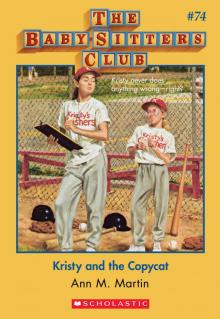 Kristy and the Copycat
Kristy and the Copycat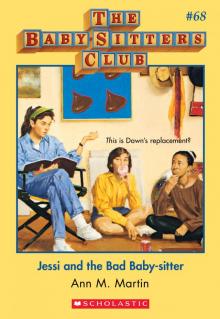 Jessi and the Bad Baby-Sitter
Jessi and the Bad Baby-Sitter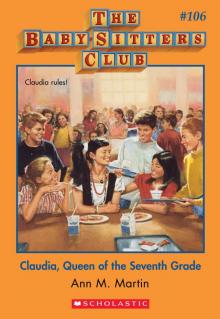 Claudia, Queen of the Seventh Grade
Claudia, Queen of the Seventh Grade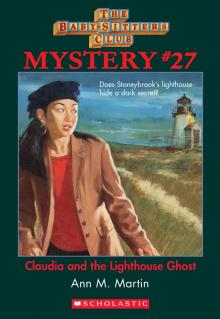 Claudia and the Lighthouse Ghost
Claudia and the Lighthouse Ghost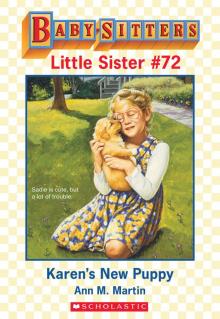 Karen's New Puppy
Karen's New Puppy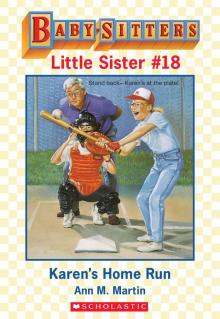 Karen's Home Run
Karen's Home Run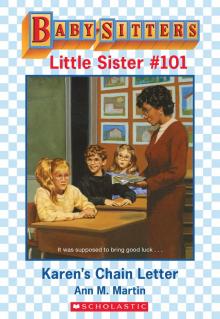 Karen's Chain Letter
Karen's Chain Letter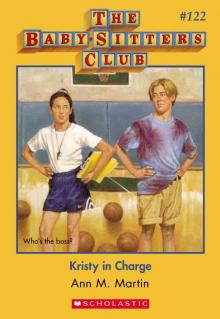 Kristy in Charge
Kristy in Charge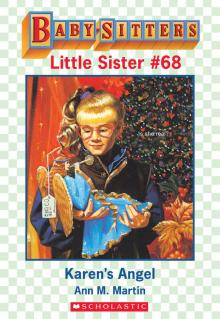 Karen's Angel
Karen's Angel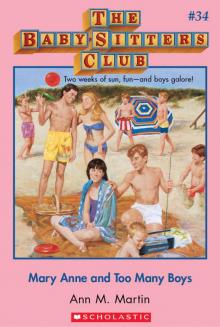 Mary Anne and Too Many Boys
Mary Anne and Too Many Boys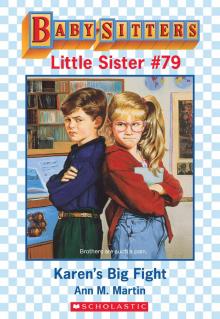 Karen's Big Fight
Karen's Big Fight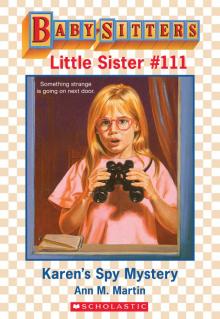 Karen's Spy Mystery
Karen's Spy Mystery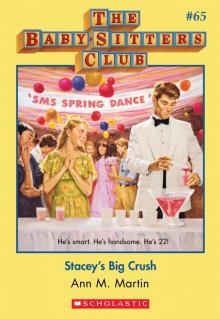 Stacey's Big Crush
Stacey's Big Crush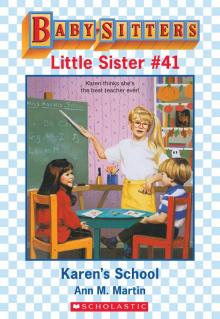 Karen's School
Karen's School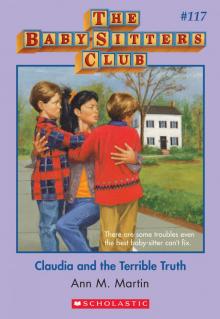 Claudia and the Terrible Truth
Claudia and the Terrible Truth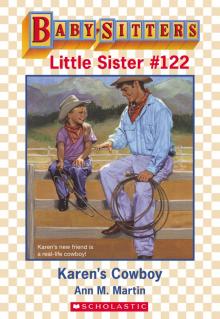 Karen's Cowboy
Karen's Cowboy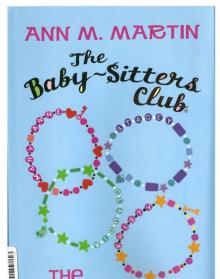 The Summer Before
The Summer Before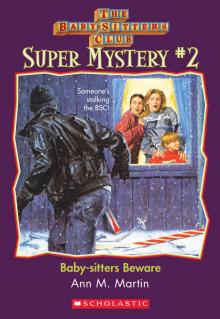 Beware, Dawn!
Beware, Dawn!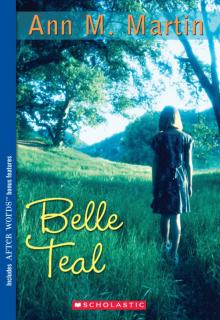 Belle Teale
Belle Teale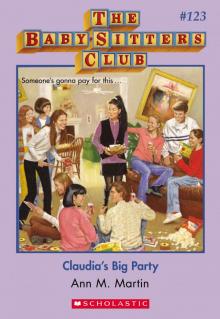 Claudia's Big Party
Claudia's Big Party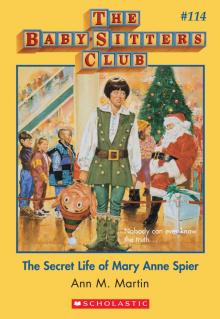 The Secret Life of Mary Anne Spier
The Secret Life of Mary Anne Spier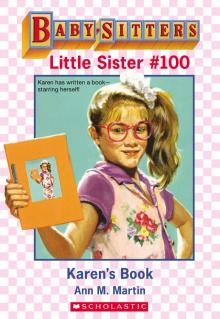 Karen's Book
Karen's Book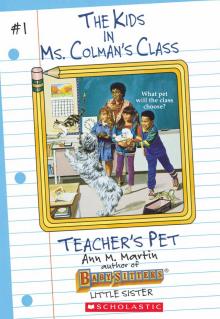 Teacher's Pet
Teacher's Pet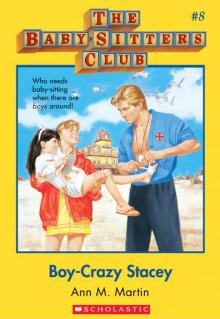 Boy-Crazy Stacey
Boy-Crazy Stacey Claudia and the Disaster Date
Claudia and the Disaster Date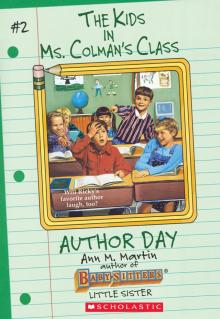 Author Day
Author Day Claudia and the Sad Good-Bye
Claudia and the Sad Good-Bye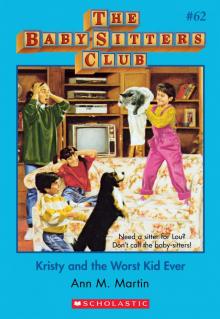 Kristy and the Worst Kid Ever
Kristy and the Worst Kid Ever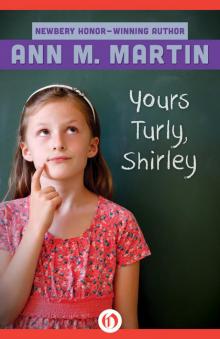 Yours Turly, Shirley
Yours Turly, Shirley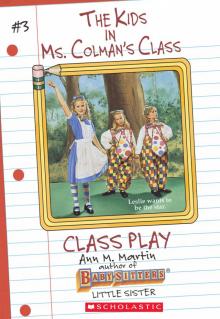 Class Play
Class Play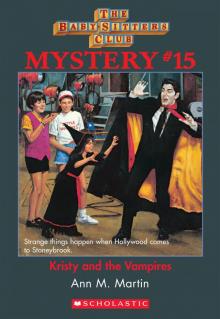 Kristy and the Vampires
Kristy and the Vampires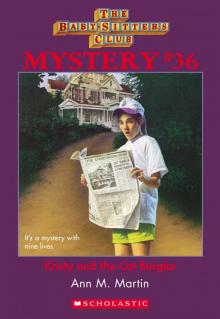 Kristy and the Cat Burglar
Kristy and the Cat Burglar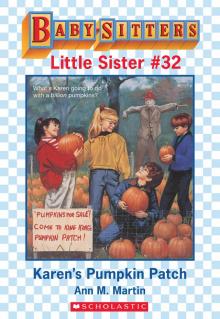 Karen's Pumpkin Patch
Karen's Pumpkin Patch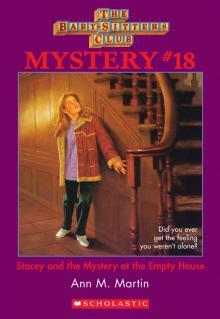 Stacey and the Mystery at the Empty House
Stacey and the Mystery at the Empty House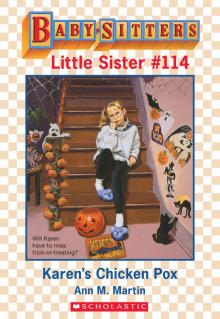 Karen's Chicken Pox
Karen's Chicken Pox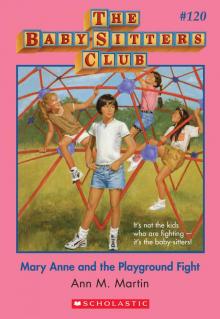 Mary Anne and the Playground Fight
Mary Anne and the Playground Fight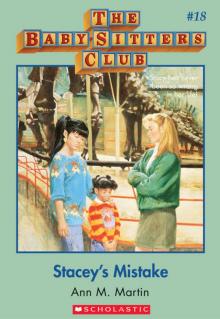 Stacey's Mistake
Stacey's Mistake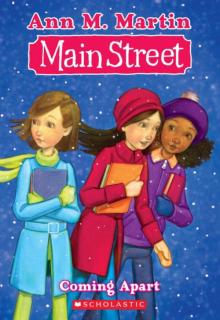 Coming Apart
Coming Apart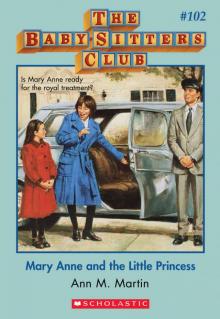 Mary Anne and the Little Princess
Mary Anne and the Little Princess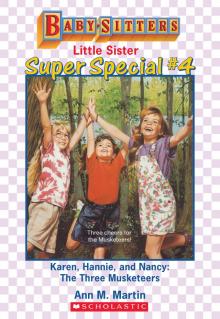 Karen, Hannie and Nancy: The Three Musketeers
Karen, Hannie and Nancy: The Three Musketeers 'Tis the Season
'Tis the Season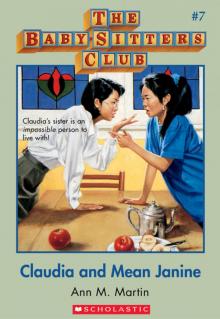 Claudia and Mean Janine
Claudia and Mean Janine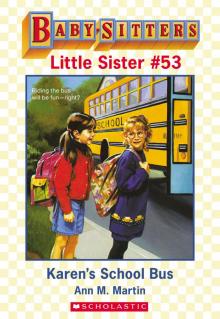 Karen's School Bus
Karen's School Bus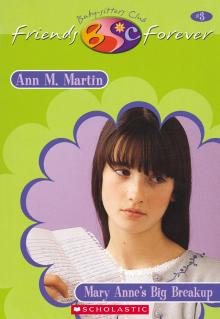 Mary Anne's Big Breakup
Mary Anne's Big Breakup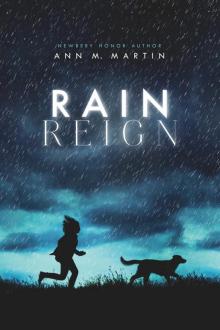 Rain Reign
Rain Reign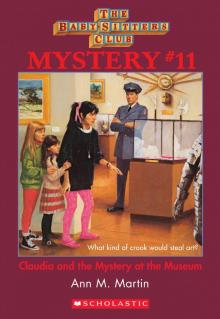 Claudia and the Mystery at the Museum
Claudia and the Mystery at the Museum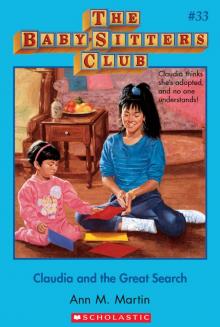 Claudia and the Great Search
Claudia and the Great Search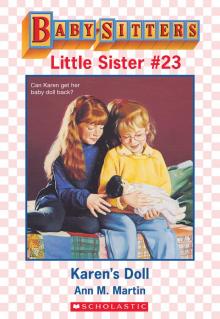 Karen's Doll
Karen's Doll Shannon's Story
Shannon's Story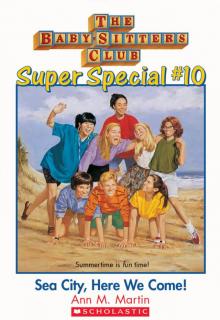 Sea City, Here We Come!
Sea City, Here We Come!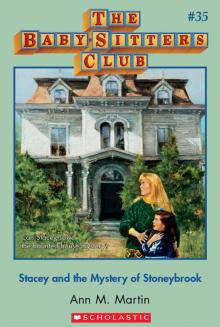 Stacey and the Mystery of Stoneybrook
Stacey and the Mystery of Stoneybrook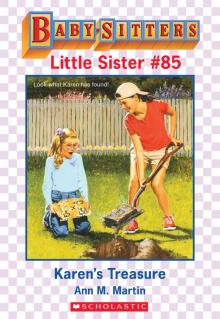 Karen's Treasure
Karen's Treasure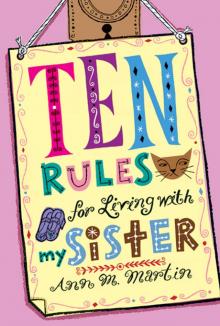 Ten Rules for Living With My Sister
Ten Rules for Living With My Sister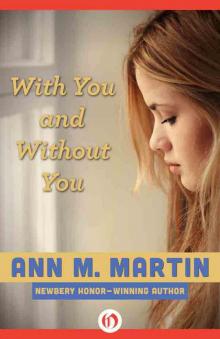 With You and Without You
With You and Without You Baby-Sitters' Island Adventure
Baby-Sitters' Island Adventure Karen's Fishing Trip
Karen's Fishing Trip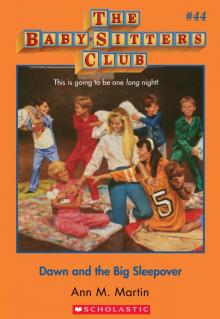 Dawn and the Big Sleepover
Dawn and the Big Sleepover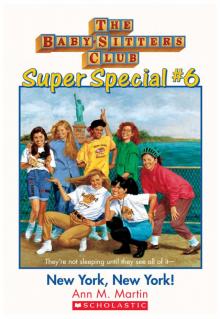 New York, New York!
New York, New York!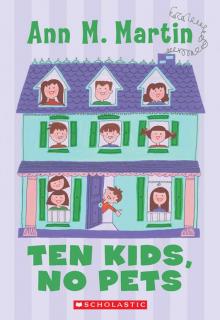 Ten Kids, No Pets
Ten Kids, No Pets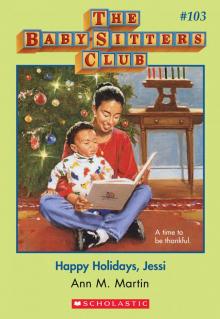 Happy Holidays, Jessi
Happy Holidays, Jessi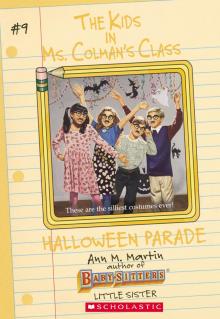 Halloween Parade
Halloween Parade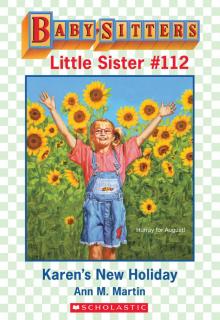 Karen's New Holiday
Karen's New Holiday Kristy Power!
Kristy Power!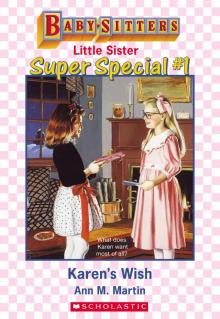 Karen's Wish
Karen's Wish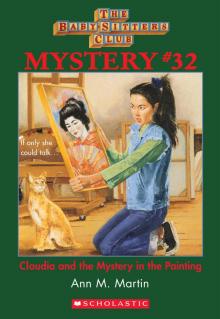 Claudia and the Mystery in the Painting
Claudia and the Mystery in the Painting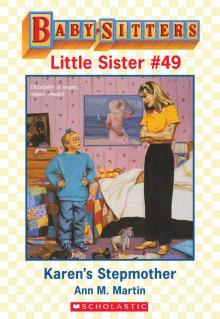 Karen's Stepmother
Karen's Stepmother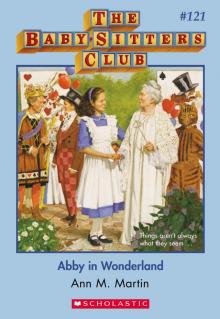 Abby in Wonderland
Abby in Wonderland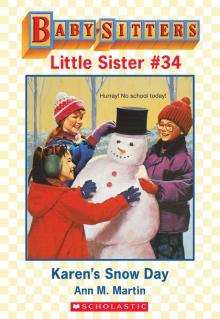 Karen's Snow Day
Karen's Snow Day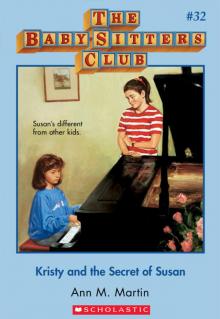 Kristy and the Secret of Susan
Kristy and the Secret of Susan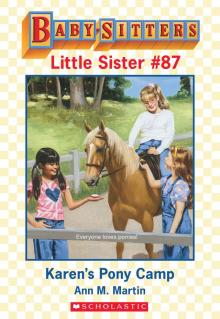 Karen's Pony Camp
Karen's Pony Camp Karen's School Trip
Karen's School Trip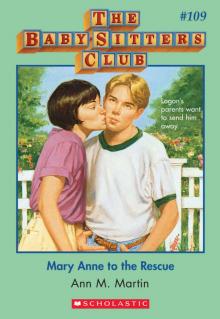 Mary Anne to the Rescue
Mary Anne to the Rescue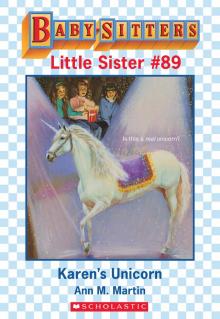 Karen's Unicorn
Karen's Unicorn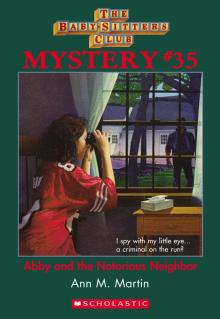 Abby and the Notorious Neighbor
Abby and the Notorious Neighbor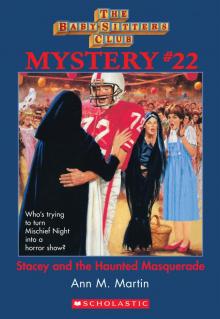 Stacey and the Haunted Masquerade
Stacey and the Haunted Masquerade Claudia Gets Her Guy
Claudia Gets Her Guy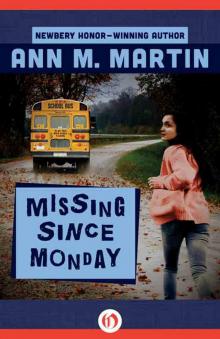 Missing Since Monday
Missing Since Monday Stacey's Choice
Stacey's Choice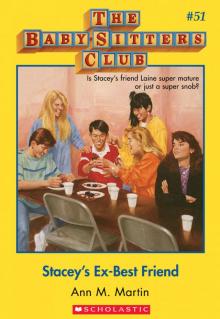 Stacey's Ex-Best Friend
Stacey's Ex-Best Friend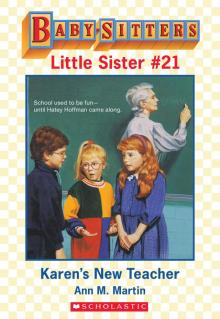 Karen's New Teacher
Karen's New Teacher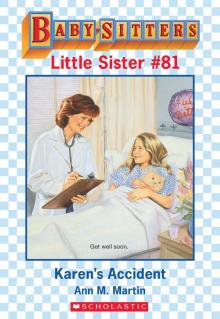 Karen's Accident
Karen's Accident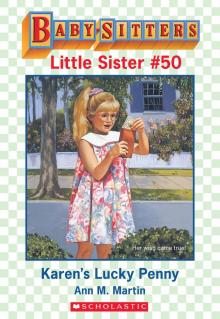 Karen's Lucky Penny
Karen's Lucky Penny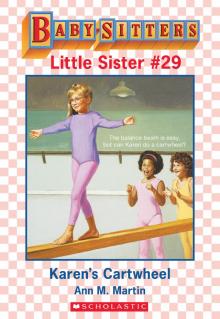 Karen's Cartwheel
Karen's Cartwheel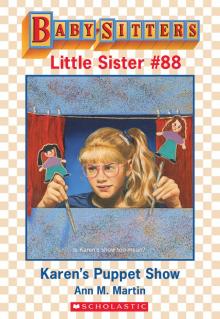 Karen's Puppet Show
Karen's Puppet Show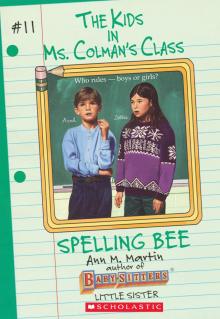 Spelling Bee
Spelling Bee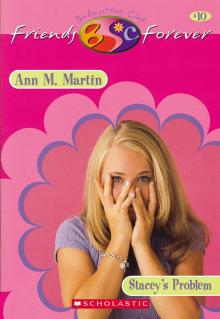 Stacey's Problem
Stacey's Problem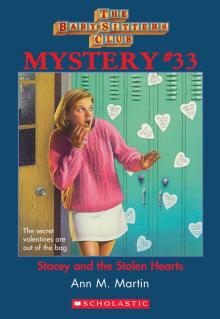 Stacey and the Stolen Hearts
Stacey and the Stolen Hearts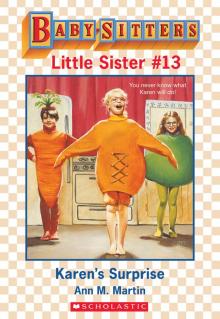 Karen's Surprise
Karen's Surprise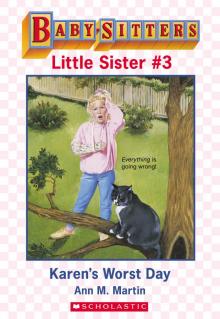 Karen's Worst Day
Karen's Worst Day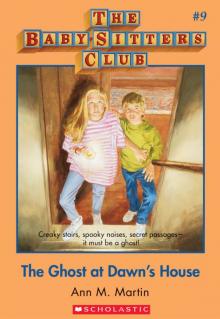 The Ghost at Dawn's House
The Ghost at Dawn's House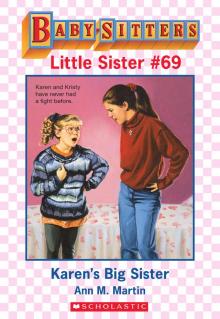 Karen's Big Sister
Karen's Big Sister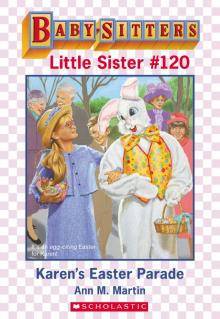 Karen's Easter Parade
Karen's Easter Parade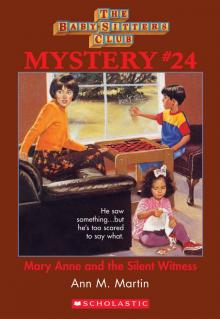 Mary Anne and the Silent Witness
Mary Anne and the Silent Witness Karen's Swim Meet
Karen's Swim Meet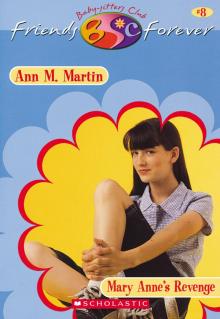 Mary Anne's Revenge
Mary Anne's Revenge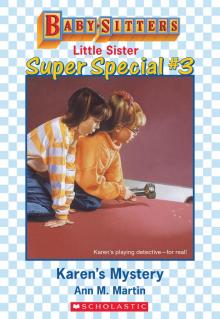 Karen's Mystery
Karen's Mystery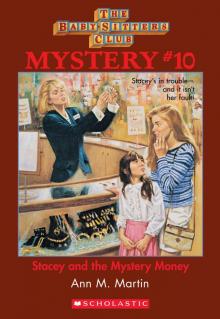 Stacey and the Mystery Money
Stacey and the Mystery Money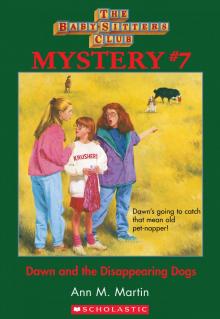 Dawn and the Disappearing Dogs
Dawn and the Disappearing Dogs Karen's Christmas Tree
Karen's Christmas Tree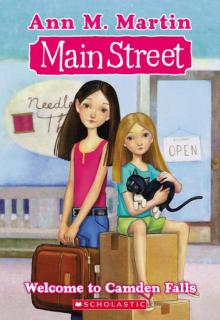 Welcome to Camden Falls
Welcome to Camden Falls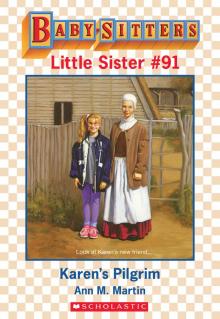 Karen's Pilgrim
Karen's Pilgrim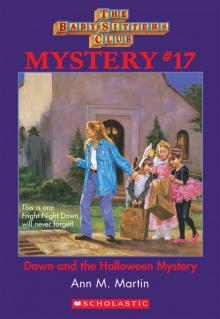 Dawn and the Halloween Mystery
Dawn and the Halloween Mystery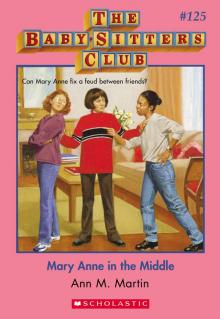 Mary Anne in the Middle
Mary Anne in the Middle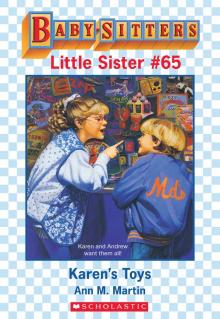 Karen's Toys
Karen's Toys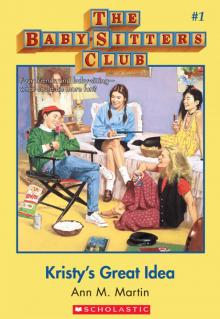 Kristy's Great Idea
Kristy's Great Idea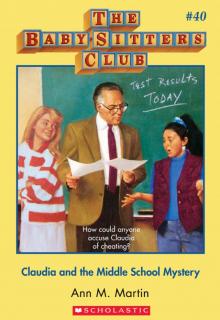 Claudia and the Middle School Mystery
Claudia and the Middle School Mystery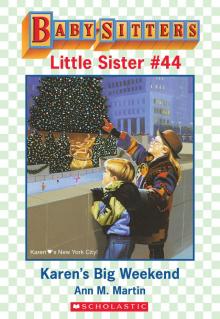 Karen's Big Weekend
Karen's Big Weekend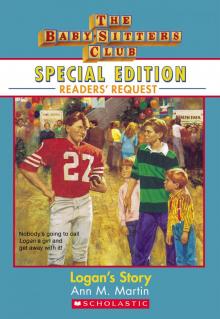 Logan's Story
Logan's Story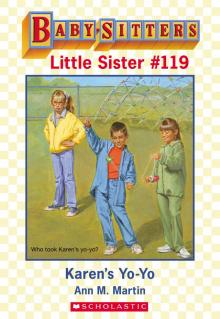 Karen's Yo-Yo
Karen's Yo-Yo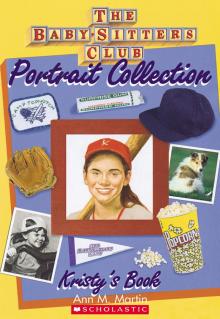 Kristy's Book
Kristy's Book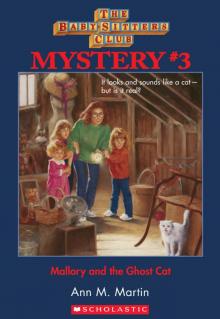 Mallory and the Ghost Cat
Mallory and the Ghost Cat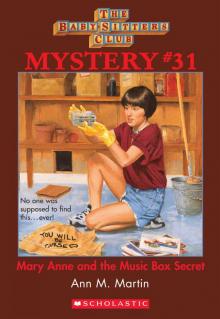 Mary Anne and the Music
Mary Anne and the Music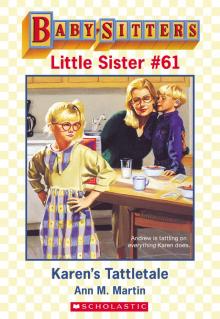 Karen's Tattletale
Karen's Tattletale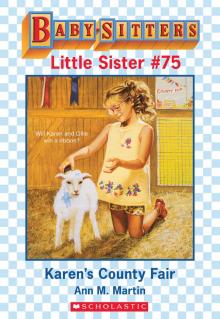 Karen's County Fair
Karen's County Fair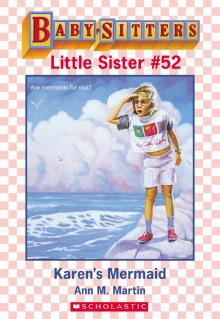 Karen's Mermaid
Karen's Mermaid Snowbound
Snowbound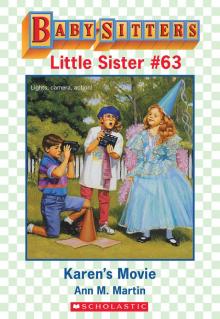 Karen's Movie
Karen's Movie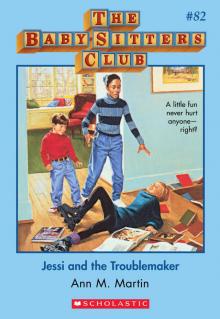 Jessi and the Troublemaker
Jessi and the Troublemaker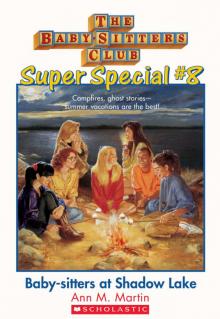 Baby-Sitters at Shadow Lake
Baby-Sitters at Shadow Lake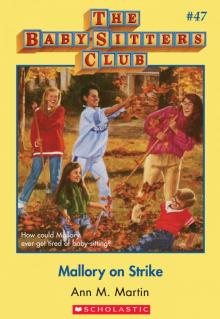 Mallory on Strike
Mallory on Strike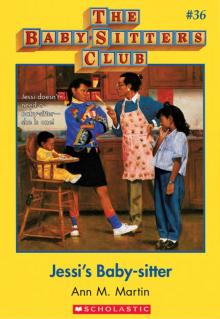 Jessi's Baby-Sitter
Jessi's Baby-Sitter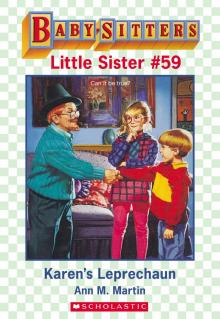 Karen's Leprechaun
Karen's Leprechaun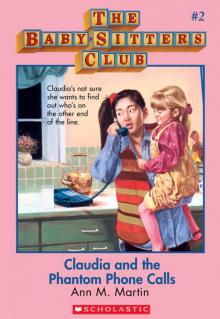 Claudia and the Phantom Phone Calls
Claudia and the Phantom Phone Calls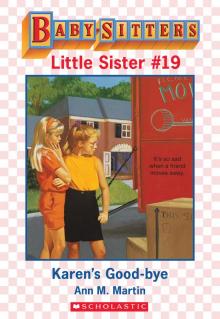 Karen's Good-Bye
Karen's Good-Bye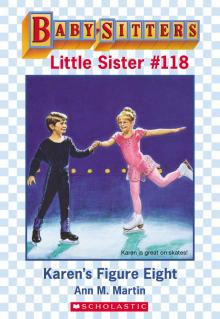 Karen's Figure Eight
Karen's Figure Eight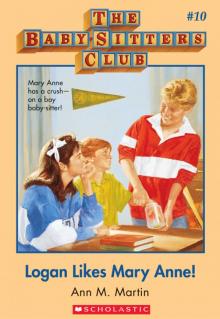 Logan Likes Mary Anne!
Logan Likes Mary Anne!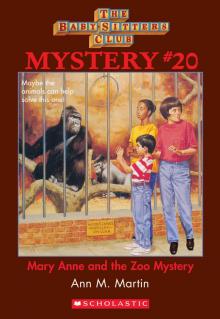 Mary Anne and the Zoo Mystery
Mary Anne and the Zoo Mystery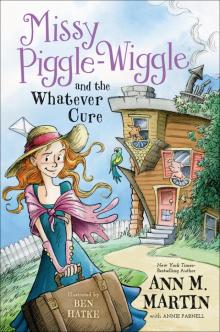 Missy Piggle-Wiggle and the Whatever Cure
Missy Piggle-Wiggle and the Whatever Cure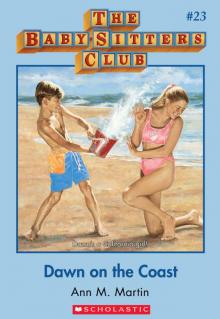 Dawn on the Coast
Dawn on the Coast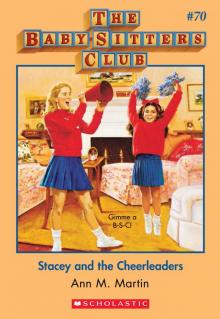 Stacey and the Cheerleaders
Stacey and the Cheerleaders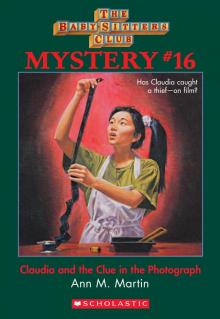 Claudia and the Clue in the Photograph
Claudia and the Clue in the Photograph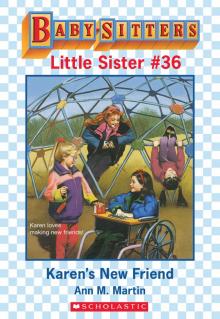 Karen's New Friend
Karen's New Friend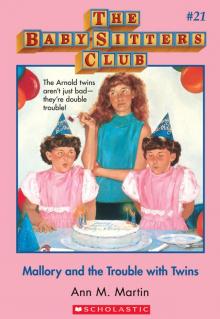 Mallory and the Trouble With Twins
Mallory and the Trouble With Twins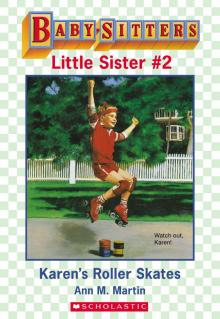 Karen's Roller Skates
Karen's Roller Skates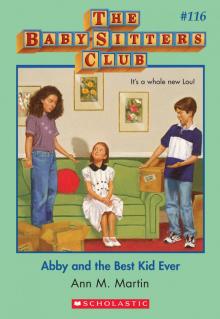 Abby and the Best Kid Ever
Abby and the Best Kid Ever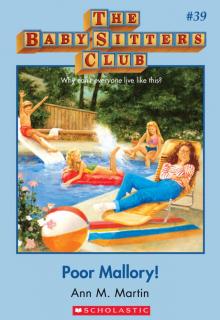 Poor Mallory!
Poor Mallory!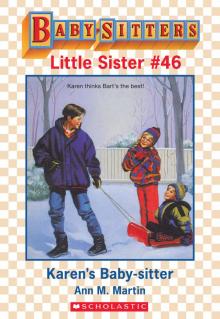 Karen's Witch
Karen's Witch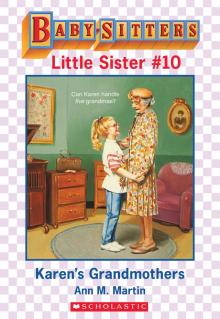 Karen's Grandmothers
Karen's Grandmothers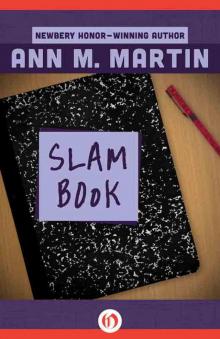 Slam Book
Slam Book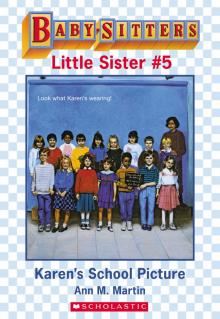 Karen's School Picture
Karen's School Picture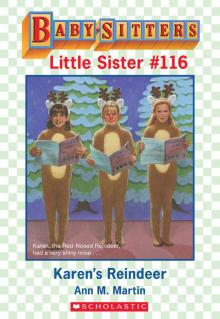 Karen's Reindeer
Karen's Reindeer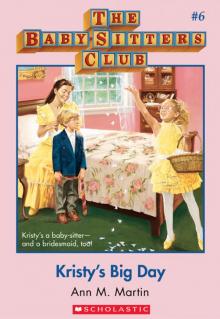 Kristy's Big Day
Kristy's Big Day The Long Way Home
The Long Way Home Karen's Sleigh Ride
Karen's Sleigh Ride On Christmas Eve
On Christmas Eve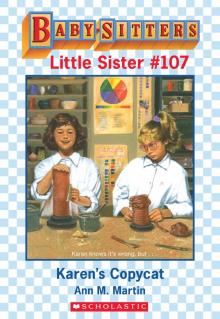 Karen's Copycat
Karen's Copycat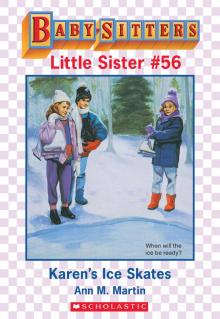 Karen's Ice Skates
Karen's Ice Skates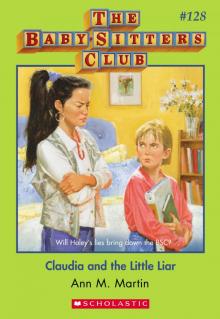 Claudia and the Little Liar
Claudia and the Little Liar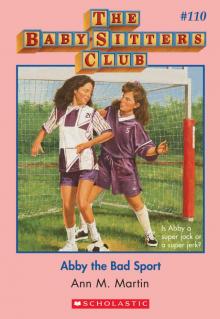 Abby the Bad Sport
Abby the Bad Sport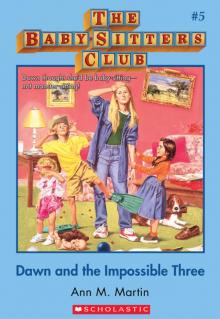 The Baby-Sitters Club #5: Dawn and the Impossible Three
The Baby-Sitters Club #5: Dawn and the Impossible Three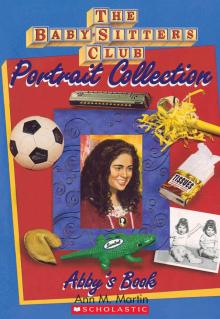 Abby's Book
Abby's Book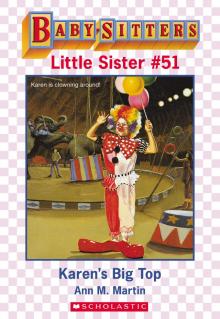 Karen's Big Top
Karen's Big Top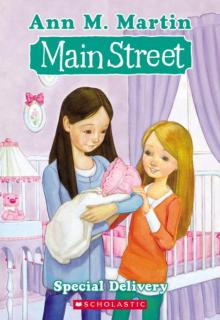 Main Street #8: Special Delivery
Main Street #8: Special Delivery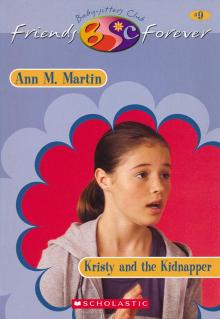 Kristy and the Kidnapper
Kristy and the Kidnapper Karen's Ski Trip
Karen's Ski Trip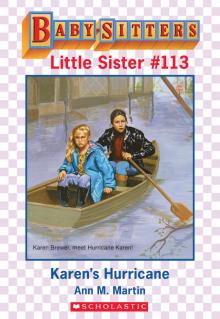 Karen's Hurricane
Karen's Hurricane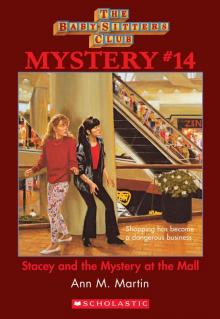 Stacey and the Mystery at the Mall
Stacey and the Mystery at the Mall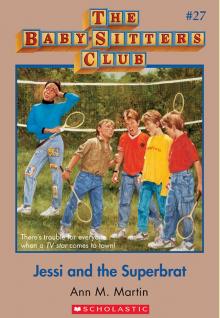 Jessi and the Superbrat
Jessi and the Superbrat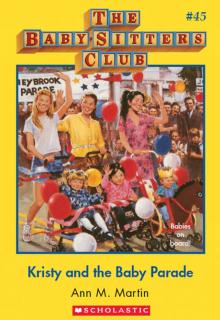 Kristy and the Baby Parade
Kristy and the Baby Parade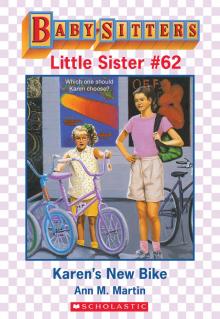 Karen's New Bike
Karen's New Bike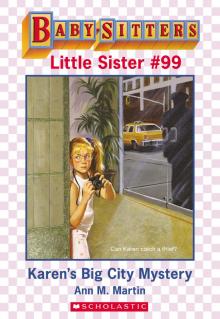 Karen's Big City Mystery
Karen's Big City Mystery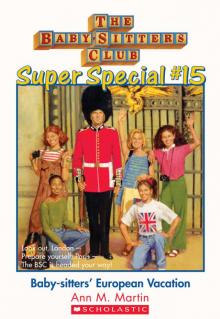 Baby-Sitters' European Vacation
Baby-Sitters' European Vacation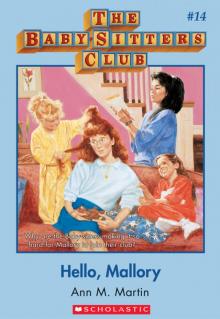 Hello, Mallory
Hello, Mallory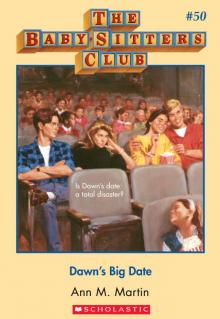 Dawn's Big Date
Dawn's Big Date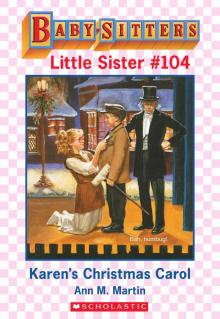 Karen's Christmas Carol
Karen's Christmas Carol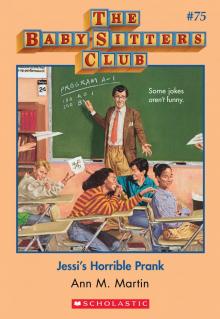 Jessi's Horrible Prank
Jessi's Horrible Prank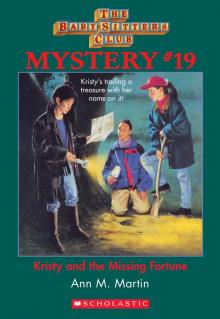 Kristy and the Missing Fortune
Kristy and the Missing Fortune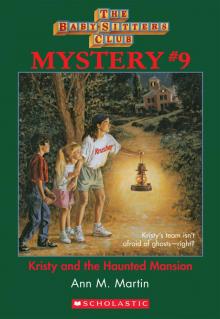 Kristy and the Haunted Mansion
Kristy and the Haunted Mansion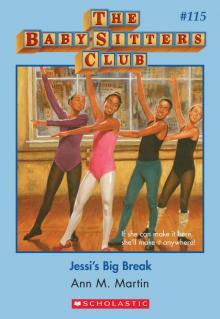 Jessi's Big Break
Jessi's Big Break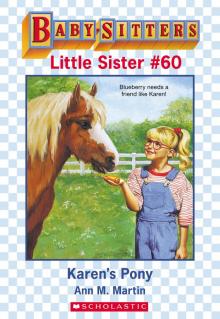 Karen's Pony
Karen's Pony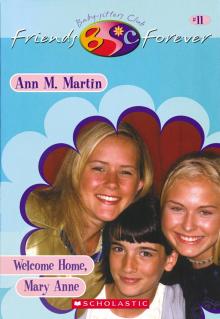 Welcome Home, Mary Anne
Welcome Home, Mary Anne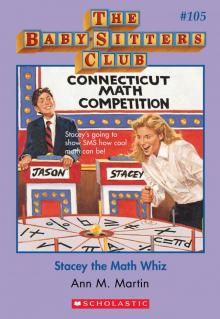 Stacey the Math Whiz
Stacey the Math Whiz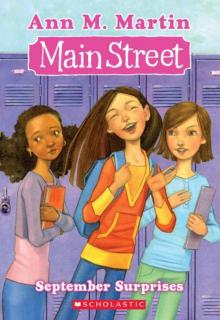 September Surprises
September Surprises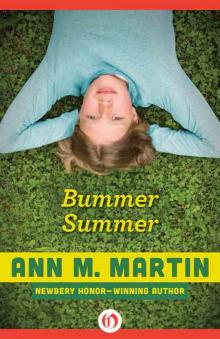 Bummer Summer
Bummer Summer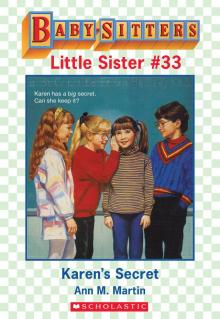 Karen's Secret
Karen's Secret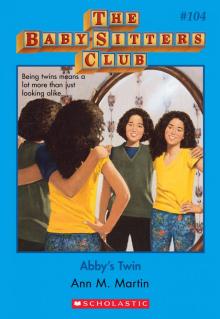 Abby's Twin
Abby's Twin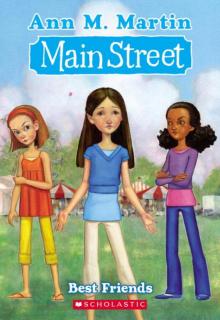 Main Street #4: Best Friends
Main Street #4: Best Friends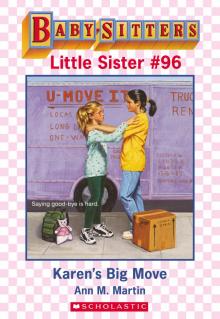 Karen's Big Move
Karen's Big Move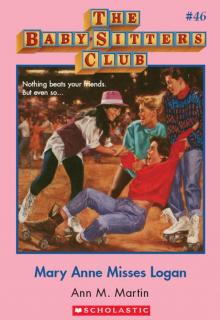 Mary Anne Misses Logan
Mary Anne Misses Logan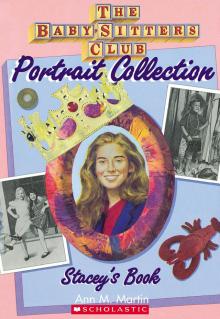 Stacey's Book
Stacey's Book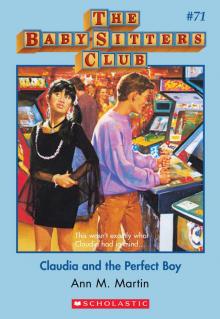 Claudia and the Perfect Boy
Claudia and the Perfect Boy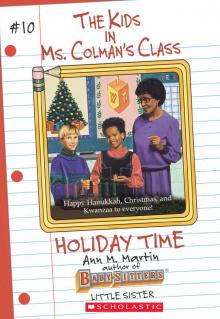 Holiday Time
Holiday Time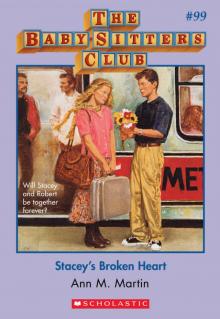 Stacey's Broken Heart
Stacey's Broken Heart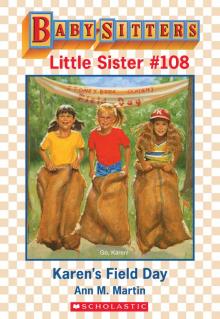 Karen's Field Day
Karen's Field Day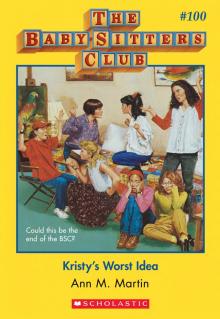 Kristy's Worst Idea
Kristy's Worst Idea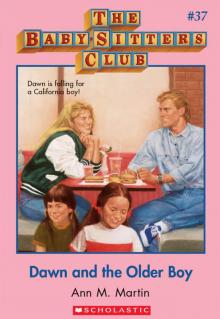 Dawn and the Older Boy
Dawn and the Older Boy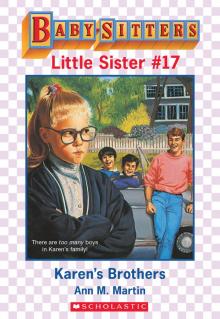 Karen's Brothers
Karen's Brothers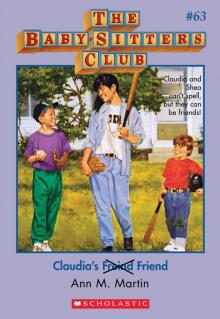 Claudia's Friend
Claudia's Friend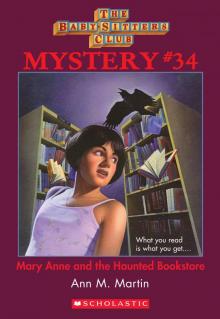 Mary Anne and the Haunted Bookstore
Mary Anne and the Haunted Bookstore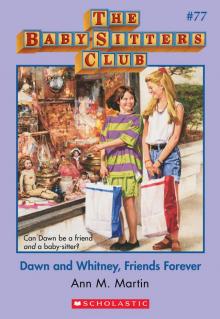 Dawn and Whitney, Friends Forever
Dawn and Whitney, Friends Forever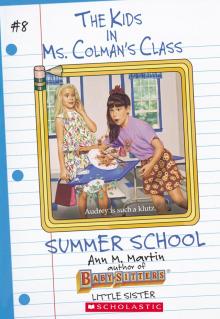 Summer School
Summer School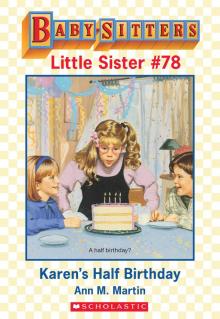 Karen's Birthday
Karen's Birthday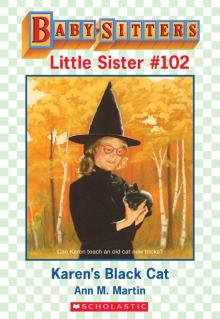 Karen's Black Cat
Karen's Black Cat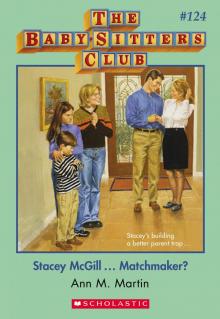 Stacey McGill... Matchmaker?
Stacey McGill... Matchmaker?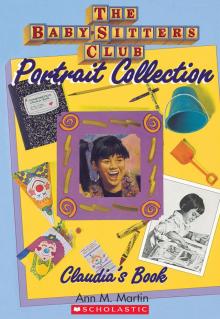 Claudia's Book
Claudia's Book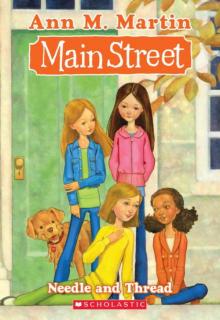 Main Street #2: Needle and Thread
Main Street #2: Needle and Thread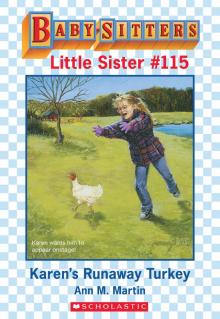 Karen's Runaway Turkey
Karen's Runaway Turkey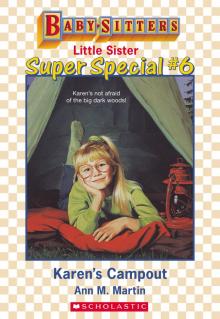 Karen's Campout
Karen's Campout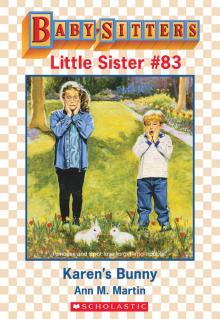 Karen's Bunny
Karen's Bunny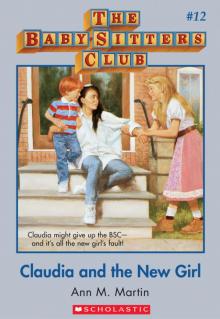 Claudia and the New Girl
Claudia and the New Girl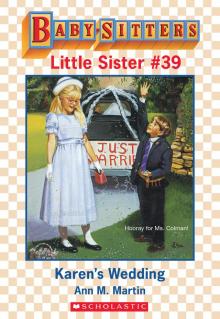 Karen's Wedding
Karen's Wedding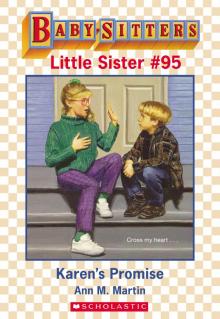 Karen's Promise
Karen's Promise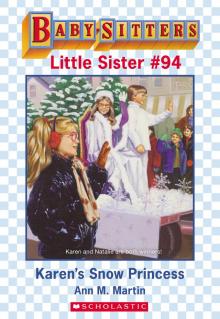 Karen's Snow Princess
Karen's Snow Princess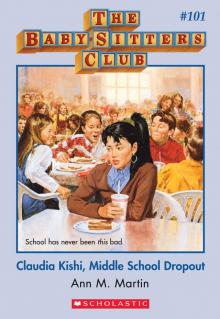 Claudia Kishi, Middle School Dropout
Claudia Kishi, Middle School Dropout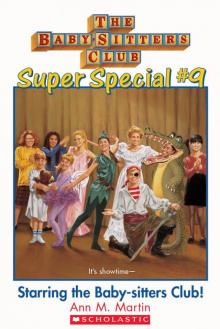 Starring the Baby-Sitters Club!
Starring the Baby-Sitters Club!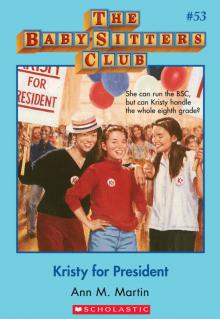 Kristy for President
Kristy for President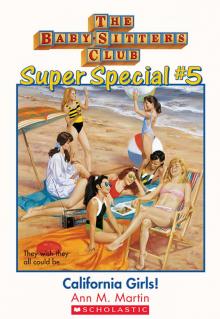 California Girls!
California Girls!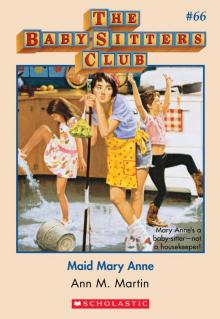 Maid Mary Anne
Maid Mary Anne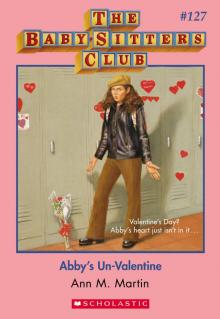 Abby's Un-Valentine
Abby's Un-Valentine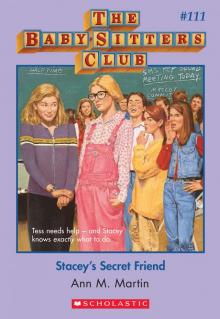 Stacey's Secret Friend
Stacey's Secret Friend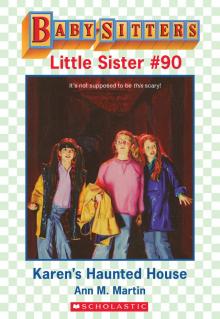 Karen's Haunted House
Karen's Haunted House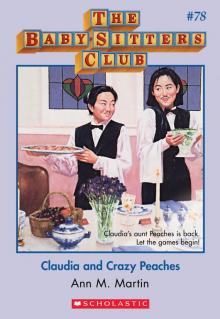 Claudia and Crazy Peaches
Claudia and Crazy Peaches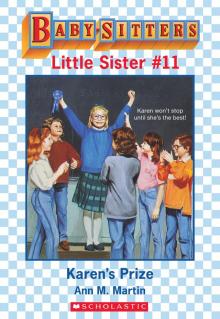 Karen's Prize
Karen's Prize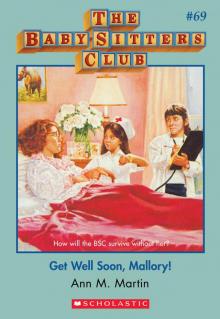 Get Well Soon, Mallory!
Get Well Soon, Mallory!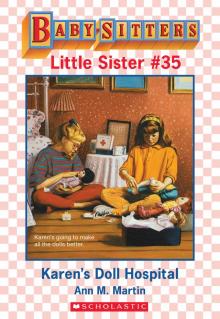 Karen's Doll Hospital
Karen's Doll Hospital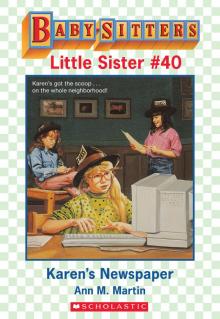 Karen's Newspaper
Karen's Newspaper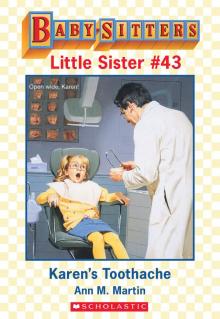 Karen's Toothache
Karen's Toothache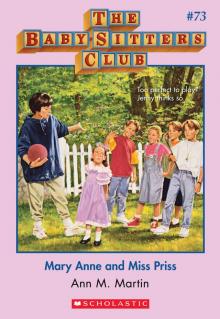 Mary Anne and Miss Priss
Mary Anne and Miss Priss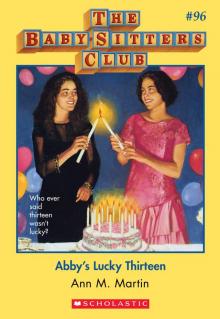 Abby's Lucky Thirteen
Abby's Lucky Thirteen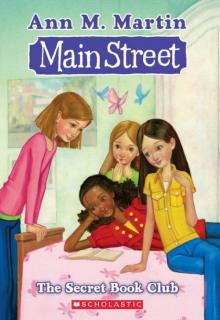 The Secret Book Club
The Secret Book Club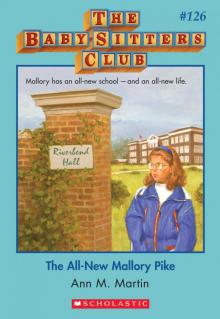 The All-New Mallory Pike
The All-New Mallory Pike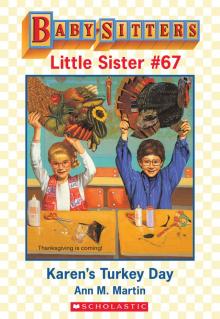 Karen's Turkey Day
Karen's Turkey Day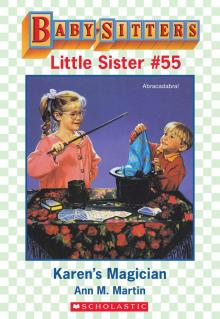 Karen's Magician
Karen's Magician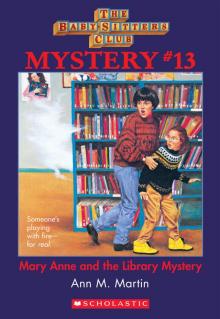 Mary Anne and the Library Mystery
Mary Anne and the Library Mystery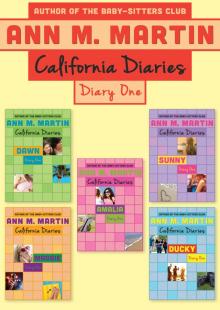 Diary One: Dawn, Sunny, Maggie, Amalia, and Ducky
Diary One: Dawn, Sunny, Maggie, Amalia, and Ducky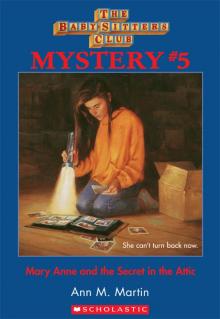 Mary Anne and the Secret in the Attic
Mary Anne and the Secret in the Attic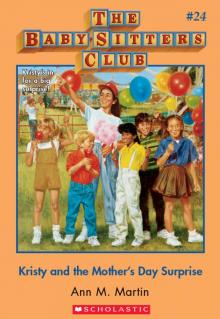 Kristy and the Mother's Day Surprise
Kristy and the Mother's Day Surprise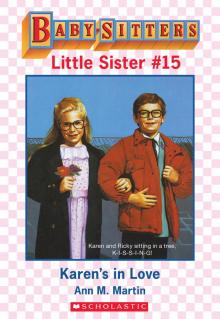 Karen's in Love
Karen's in Love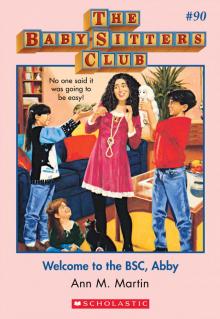 Welcome to the BSC, Abby
Welcome to the BSC, Abby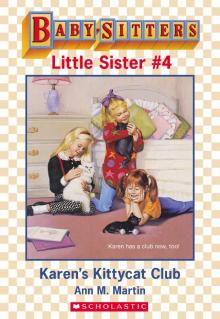 Karen's Kittycat Club
Karen's Kittycat Club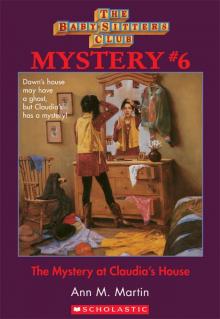 The Mystery at Claudia's House
The Mystery at Claudia's House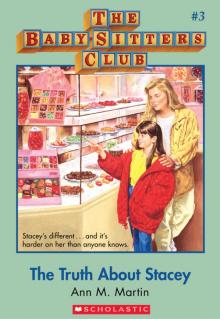 The Truth About Stacey
The Truth About Stacey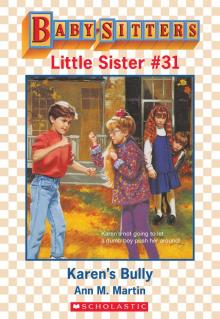 Karen's Bully
Karen's Bully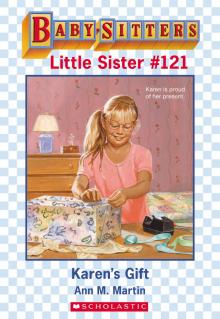 Karen's Gift
Karen's Gift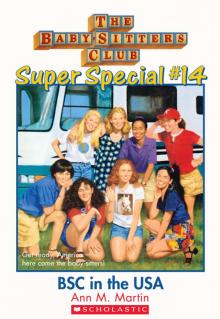 BSC in the USA
BSC in the USA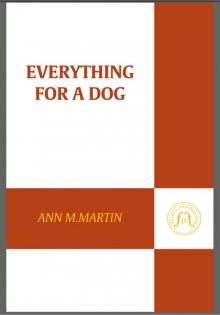 Everything for a Dog
Everything for a Dog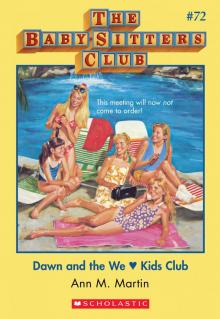 Dawn and the We Love Kids Club
Dawn and the We Love Kids Club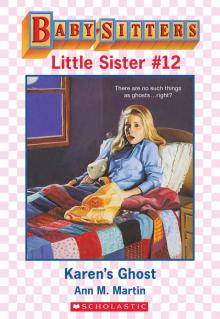 Karen's Ghost
Karen's Ghost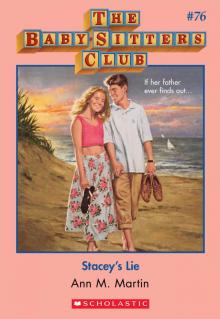 Stacey's Lie
Stacey's Lie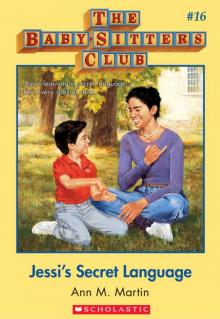 Jessi's Secret Language
Jessi's Secret Language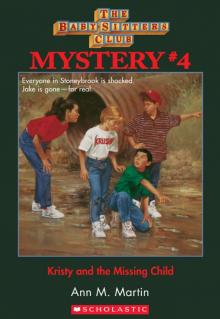 Kristy and the Missing Child
Kristy and the Missing Child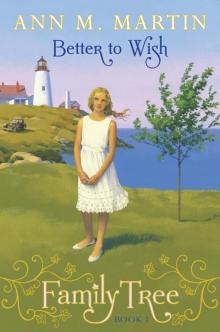 Better to Wish
Better to Wish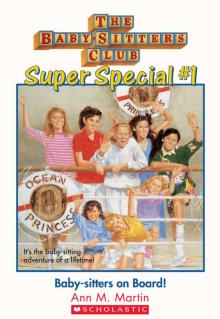 Baby-Sitters on Board!
Baby-Sitters on Board!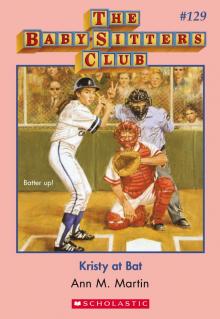 Kristy at Bat
Kristy at Bat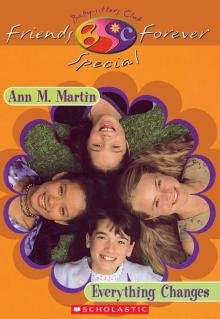 Everything Changes
Everything Changes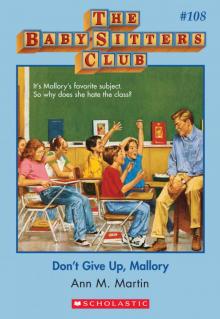 Don't Give Up, Mallory
Don't Give Up, Mallory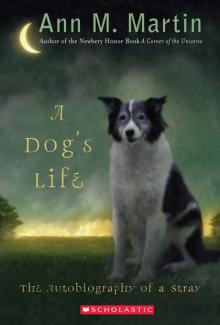 A Dog's Life: The Autobiography of a Stray
A Dog's Life: The Autobiography of a Stray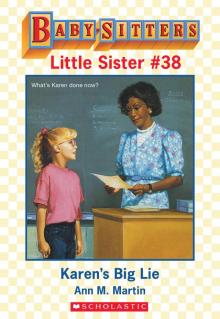 Karen's Big Lie
Karen's Big Lie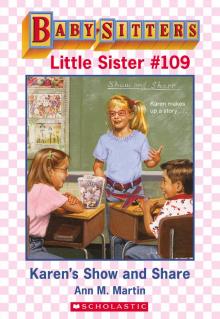 Karen's Show and Share
Karen's Show and Share Mallory Hates Boys (and Gym)
Mallory Hates Boys (and Gym)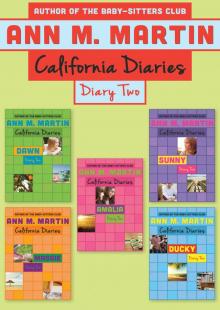 Diary Two: Dawn, Sunny, Maggie, Amalia, and Ducky
Diary Two: Dawn, Sunny, Maggie, Amalia, and Ducky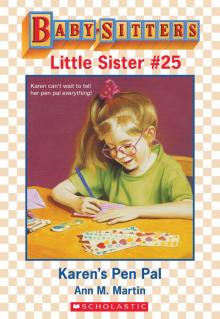 Karen's Pen Pal
Karen's Pen Pal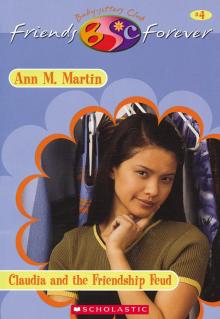 Claudia and the Friendship Feud
Claudia and the Friendship Feud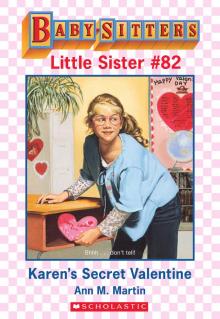 Karen's Secret Valentine
Karen's Secret Valentine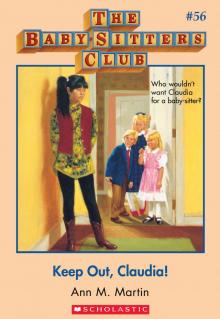 Keep Out, Claudia!
Keep Out, Claudia! Aloha, Baby-Sitters!
Aloha, Baby-Sitters!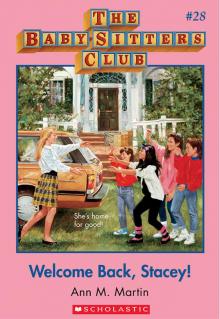 Welcome Back, Stacey
Welcome Back, Stacey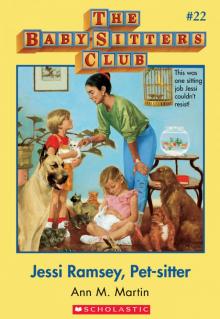 Jessi Ramsey, Pet-Sitter
Jessi Ramsey, Pet-Sitter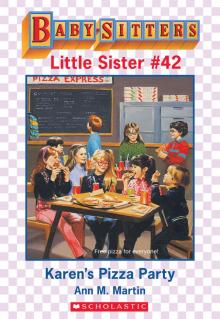 Karen's Pizza Party
Karen's Pizza Party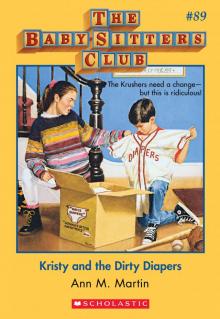 Kristy and the Dirty Diapers
Kristy and the Dirty Diapers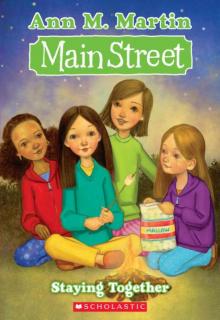 Staying Together
Staying Together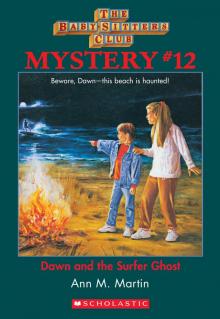 Dawn and the Surfer Ghost
Dawn and the Surfer Ghost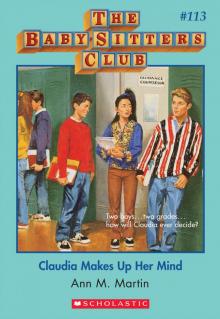 Claudia Makes Up Her Mind
Claudia Makes Up Her Mind Jessi's Gold Medal
Jessi's Gold Medal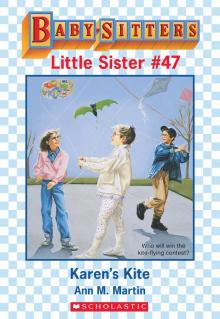 Karen's Kite
Karen's Kite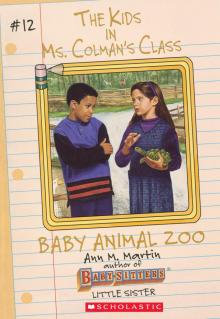 Baby Animal Zoo
Baby Animal Zoo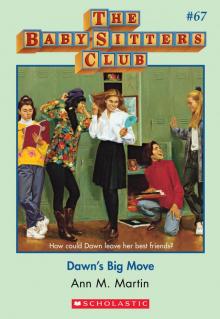 Dawn's Big Move
Dawn's Big Move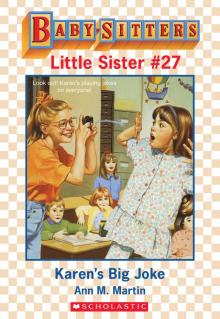 Karen's Big Joke
Karen's Big Joke Karen's Lemonade Stand
Karen's Lemonade Stand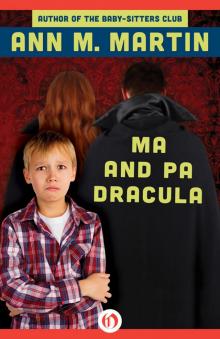 Ma and Pa Dracula
Ma and Pa Dracula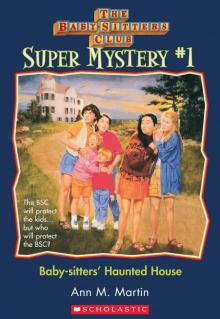 Baby-Sitters' Haunted House
Baby-Sitters' Haunted House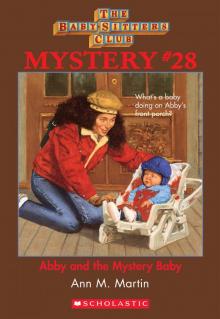 Abby and the Mystery Baby
Abby and the Mystery Baby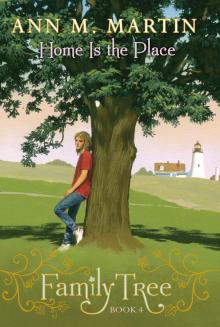 Home Is the Place
Home Is the Place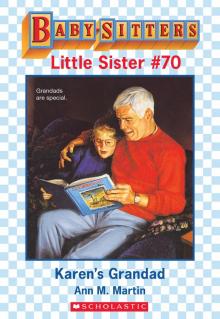 Karen's Grandad
Karen's Grandad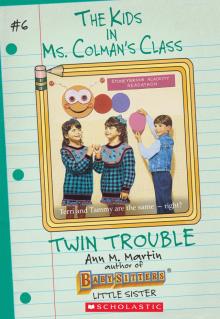 Twin Trouble
Twin Trouble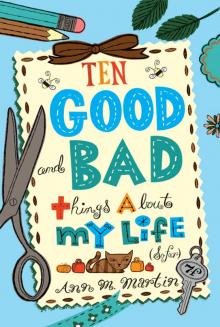 Ten Good and Bad Things About My Life (So Far)
Ten Good and Bad Things About My Life (So Far)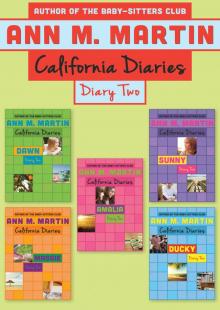 Diary Two
Diary Two Baby-Sitters Club 027
Baby-Sitters Club 027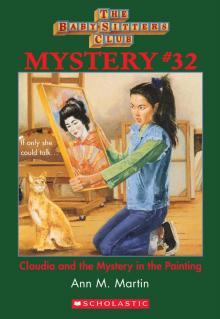 Claudia and the Mystery Painting
Claudia and the Mystery Painting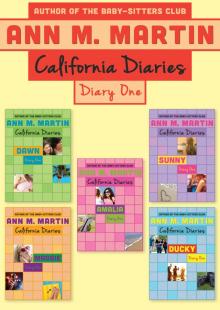 Diary One
Diary One Baby-Sitters Club 037
Baby-Sitters Club 037 Baby-Sitters Club 028
Baby-Sitters Club 028 Baby-Sitters Club 085
Baby-Sitters Club 085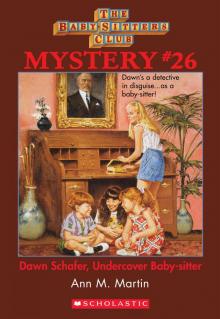 Dawn Schaffer Undercover Baby-Sitter
Dawn Schaffer Undercover Baby-Sitter Jessi's Babysitter
Jessi's Babysitter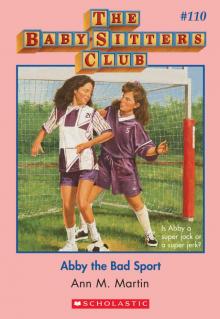 The Baby-Sitters Club #110: Abby the Bad Sport (Baby-Sitters Club, The)
The Baby-Sitters Club #110: Abby the Bad Sport (Baby-Sitters Club, The) Karen's Little Sister
Karen's Little Sister Baby-Sitters Club 058
Baby-Sitters Club 058 Claudia And The Genius On Elm St.
Claudia And The Genius On Elm St.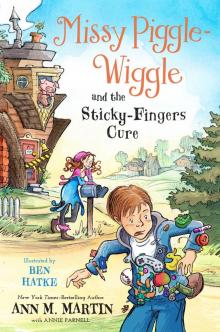 Missy Piggle-Wiggle and the Sticky-Fingers Cure
Missy Piggle-Wiggle and the Sticky-Fingers Cure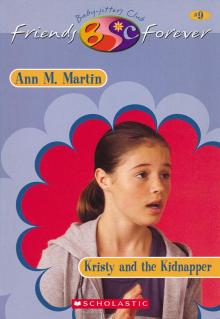 Kristy and Kidnapper
Kristy and Kidnapper Baby-Sitters Club 041
Baby-Sitters Club 041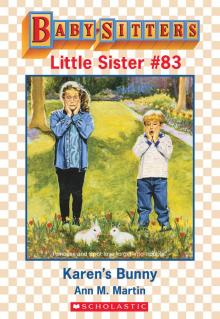 Karen's Bunny Trouble
Karen's Bunny Trouble Baby-Sitters Club 032
Baby-Sitters Club 032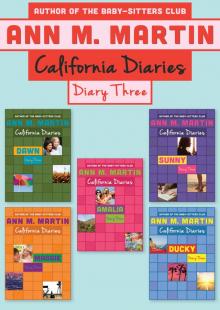 Diary Three
Diary Three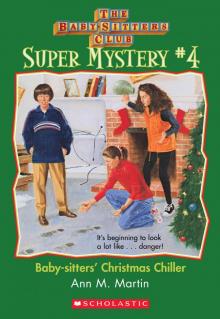 Christmas Chiller
Christmas Chiller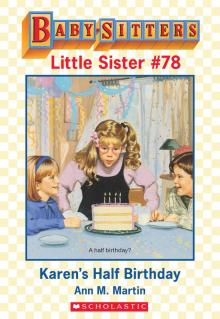 Karen's Half-Birthday
Karen's Half-Birthday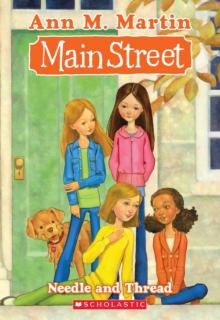 Needle and Thread
Needle and Thread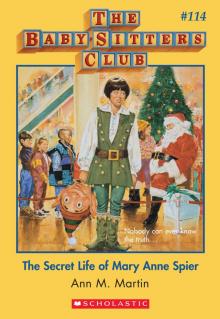 Secret Life of Mary Anne Spier
Secret Life of Mary Anne Spier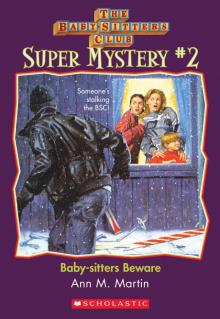 Baby-Sitters Beware
Baby-Sitters Beware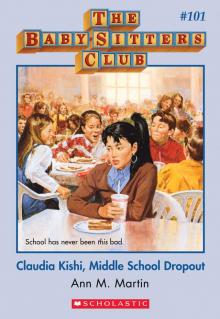 Claudia Kishi, Middle School Drop-Out
Claudia Kishi, Middle School Drop-Out Logan Likes Mary Anne !
Logan Likes Mary Anne ! Baby-Sitters Club 061
Baby-Sitters Club 061 Best Friends
Best Friends Baby-Sitters Club 031
Baby-Sitters Club 031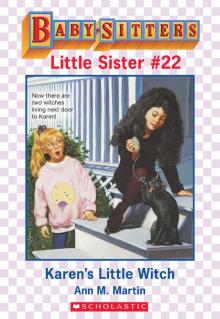 Karen's Little Witch
Karen's Little Witch Jessi Ramsey, Petsitter
Jessi Ramsey, Petsitter Baby-Sitters Club 123
Baby-Sitters Club 123 Baby-Sitters Club 059
Baby-Sitters Club 059 Baby-Sitters Club 033
Baby-Sitters Club 033 Baby-Sitters Club 060
Baby-Sitters Club 060 Baby-Sitters Club 094
Baby-Sitters Club 094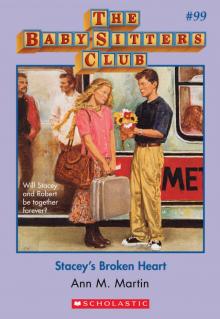 The Baby-Sitters Club #99: Stacey's Broken Heart
The Baby-Sitters Club #99: Stacey's Broken Heart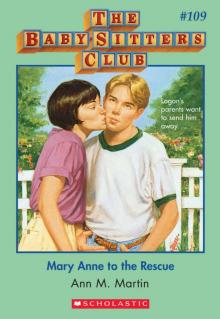 The Baby-Sitters Club #109: Mary Anne to the Rescue (Baby-Sitters Club, The)
The Baby-Sitters Club #109: Mary Anne to the Rescue (Baby-Sitters Club, The) Mystery At Claudia's House
Mystery At Claudia's House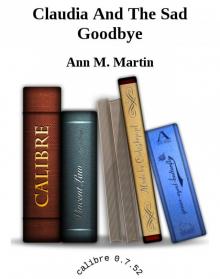 Claudia And The Sad Goodbye
Claudia And The Sad Goodbye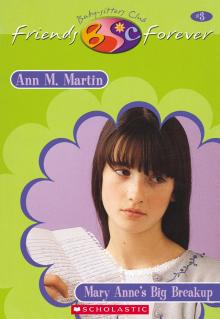 Mary Anne's Big Break-Up
Mary Anne's Big Break-Up Baby-Sitters Club 025
Baby-Sitters Club 025 Baby-Sitters Club 042
Baby-Sitters Club 042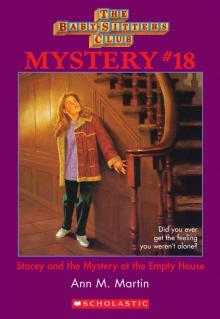 Stacey and the Mystery of the Empty House
Stacey and the Mystery of the Empty House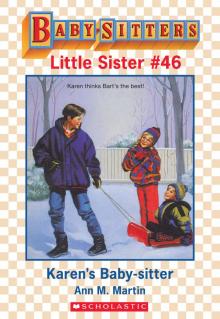 Karen's Baby-Sitter
Karen's Baby-Sitter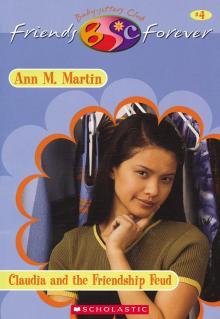 Claudia's Friendship Feud
Claudia's Friendship Feud Baby-Sitters Club 090
Baby-Sitters Club 090 Baby-Sitters Club 021
Baby-Sitters Club 021 Baby-Sitters Club 056
Baby-Sitters Club 056 Baby-Sitters Club 040
Baby-Sitters Club 040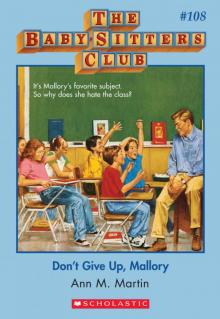 The Baby-Sitters Club #108: Don't Give Up, Mallory (Baby-Sitters Club, The)
The Baby-Sitters Club #108: Don't Give Up, Mallory (Baby-Sitters Club, The)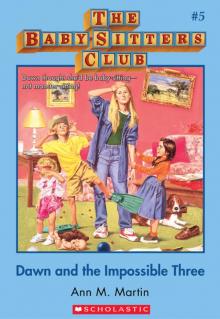 Dawn and the Impossible Three
Dawn and the Impossible Three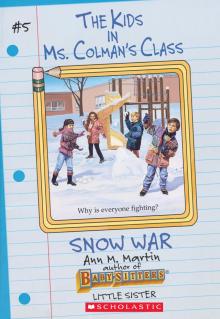 The Snow War
The Snow War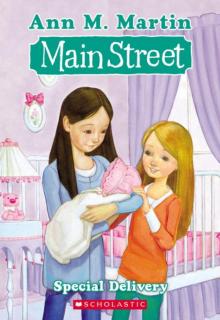 Special Delivery
Special Delivery Baby-Sitters Club 057
Baby-Sitters Club 057 Mary Anne And Too Many Babies
Mary Anne And Too Many Babies Baby-Sitters Club 030
Baby-Sitters Club 030